People 47
Cuba Mourns Winnie Mandela’s death

Cuba Mourns Winnie Mandela’s death
In the afternoon of Wednesday, the Vice President of the Council of State, Mercedes López Acea, signed the book of condolences at the South African Embassy on the island due to the death of the South African leader Winnie Mandela.
Author: Darcy Borrero Batista | darcy@granma.cu
April 11, 2018 15:04:35
A CubaNews translation. Edited by Walter Lippmann.
In the afternoon of Wednesday afternoon, Mercedes López Acea, Vice President of the Council of State, signed the book of condolences at the South African Embassy on the island due to the death of the South African leader Winnie Mandela.
In front of Winnie’s image, surrounded by a vase of flowers, Acea, who is also the first secretary of the Party in Havana, wrote that “in view of the death of Winnie Mandela, a prominent defender of the rights of her people and an activist against the apartheid regime, we convey to the government and people of South Africa our deepest condolences on behalf of the people and the Government of Cuba, which we extend to them”.
Along with her words also appear the signatures of Vice-Chancellor Abelardo Moreno and Gisela García Rivera, Director for Sub-Saharan Africa of the Ministry of Foreign Affairs (Minrex).
The veteran anti-apartheid fighter who was the second wife of leader Nelson Mandela, became a reflection of South African women during the years of repression against the majority black population.
She died on Monday of the week before, at the age of 81.
Lizette Vila’s documentary
Paquito el de Cuba
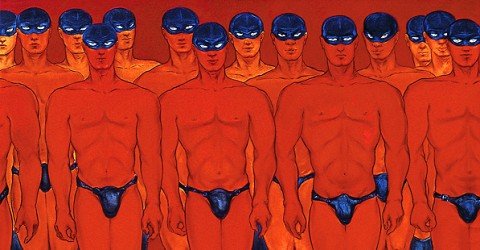
Lizette Vila’s documentary or Padres en plural
By Francisco Rodriguez Cruz
November 19, 2017.
Translated and edited by Walter Lippmann for CubaNews.
I’m not going to try to do a review or evaluation of Lizette Vila and Ingrid León’s documentary, because I’d be a judge and a party, and that would be very ugly. Even more so when I’m still under the impression of the apotheosis of the premiere that Soy papá had this Saturday, November 18th… anyway, in a Yara cinema at full capacity, which forced me to offer a double performance.
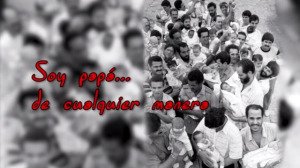 I just wanted to thank you for the gift, which was great, for my son, my partner and me, that we were able to enjoy it also among so many good and friendly people. I barely recover, though, from the shock of seeing my face – what a horror! – on the big screen.
I just wanted to thank you for the gift, which was great, for my son, my partner and me, that we were able to enjoy it also among so many good and friendly people. I barely recover, though, from the shock of seeing my face – what a horror! – on the big screen.
I also self-critically admit that I underestimated the impact of this bringing to life of the Palomas Project.
A little more than 30 minutes with the biographical shreds of a dozen or so men, I never thought they would attract so much kind and even overwhelming attention from a wide and diverse audience.
Personally, what I liked the most was to know the other stories of this choral interview – moving at times, sometimes hilarious, always authentic, by what they show, and even more, by what one can guess behind each testimony.
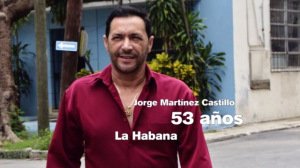 It was nice, but undeserved to be able to share the stage with such great parents at the end of the screening, and to receive with them, their families and my son Javier, the solidarity and affection that the audience lavished on us with an applause that I interpret as a recognition, not individual, but collective, for all the parents.
It was nice, but undeserved to be able to share the stage with such great parents at the end of the screening, and to receive with them, their families and my son Javier, the solidarity and affection that the audience lavished on us with an applause that I interpret as a recognition, not individual, but collective, for all the parents.
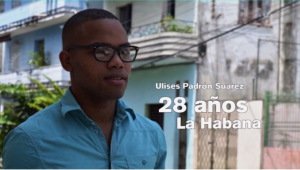
Because beyond the explicit purposes that link it with international campaigns and just social causes, this audiovisual is ultimately a claim to paternity, the best balance of which is not melodrama -which there is, there was no lack of it, we speak of Lizette Vila – but the natural force of a joy, accomplishment or pride that is difficult to explain, but easy to perceive even in her saddest or most heartbreaking stories.
Because, beyond the explicit purposes that link it with international campaigns and just social causes, this audiovisual is ultimately a claim to paternity. The best balance of this is not melodrama -which there is, there was no lack of it, we speak of Lizette Vila – but the natural force of a joy, accomplishment or pride that is difficult to explain, but easy to perceive even in her saddest or most heartbreaking stories.lk;
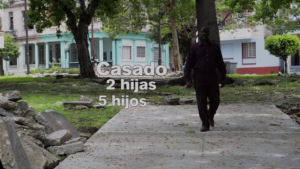
Omar Montalvo Chirino
Another great success was its projection on the eve of November 19, 2017, International Men’s Day, a celebration that has existed since the 1990s, but we rarely remember it.
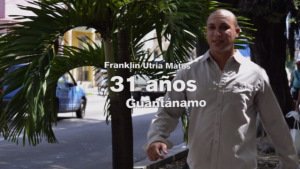
This makes it all the more valuable and timely to look at these Cuban parents – parents or biographers – who share different experiences from different ages, marital status, professions, territories; 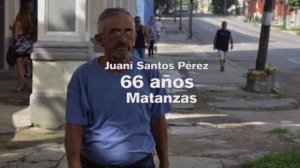
without forgetting variables such as sexual orientation and gender identity, as they include other male perspectives that the traditional notion of manhood usually tries to ignore, silence or at least diminish, disguise.
Another great success was its projection on the eve of 19 November 2017, International Men’s Day, a celebration that has existed since the 1990s, but we rarely remember it.
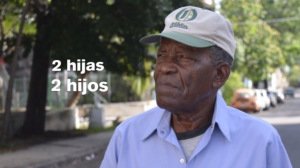
I am therefore pleased to be part of this thoughtful, disturbing and problematic tribute to the most intense and enriching human experience I know: being a father.Juan Nodarse Ramos
Thank you, Ingrid; thank you, Lizette.


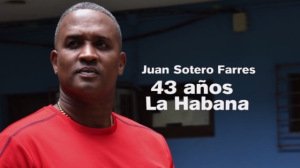
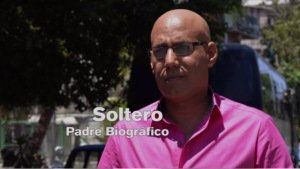
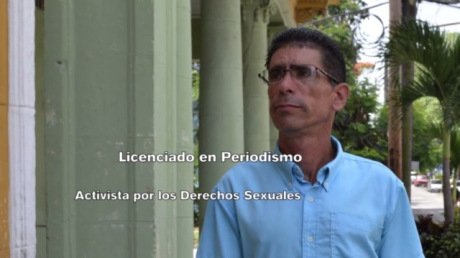
Daniel Chavarría Obituary in Granma

Daniel Chavarría, Icon of Latin American Crime Fiction, has died
Recognized in his adopted homeland with the National Literature Prize in 2010, the outstanding creator considered himself “a Cuban writer who was born in Uruguay”.
————————————————————
Author: Pedro de la Hoz | pedro@granma.cu
April 6, 2018 19:04:5
A CubaNews translation.
Edited by Walter Lippmann.
Daniel Chavarría, author of a book that revolutionized crime fiction in Latin America, died this Friday in Havana at 85.
Recognized in his adopted homeland with the National Literature Prize in 2010, the outstanding creator considered himself “a Cuban writer who was born in Uruguay.”
In doing so, he underlined his essential link with Cuba, where he arrived in 1969 and began a literary career with a firm step in 1978 when he published the novel Joy, winner three years before the Anniversary Contest of the Revolution of Police Literature organized by the Ministry of the Interior.
Since then, he won the fervor of readers and the endorsement of critics in Cuba and other countries through detective intrigue novels such as La sexta isla (The Sixth Island), El ojo de Cibele (The Eye of Cybele), Allá ellos (There They), El rojo en la pluma del loro (The Red in the Parrot’s Feather). Viudas de sangre (Blood Widows), Priapos, Una pica en Flandes (A Pike in Flanders) and El último roomservice (The Last Room Service), although he also published texts with a strong evocative charge such as Aquel año en Madrid.
Several of these books won important literary prizes, including the Casa de las Américas literary prize, the Dashiell Hammet prize for best detective novel in Spanish and the Edgar Allan Poe prize, awarded by the American professional association Mystery Writers of America.
Another notable publishing success was the publication of his memoirs And the World Walks on, which highlighted a personal life of adventure and his revolutionary consciousness.
Among his most recent works, he devoted special attention to one that he owed to his country of origin and to all those who defend the emancipatory ideal of the peoples of the continent: Yo soy el Rufo y no me rindo [I Am Rufo and I Do Not Give Up, a biographical novel on Raúl Sendic the founder of the Tupamaros, .
He was also very excited to publish some unpublished chronicles in the pages of Juventud Rebelde. Journalism burned in his veins.
MLK: The Resurrection
 MLK, Jr.: The Resurrection
MLK, Jr.: The Resurrection
By David Brooks
Translated and edited by Walter Lippmann for CubaNews
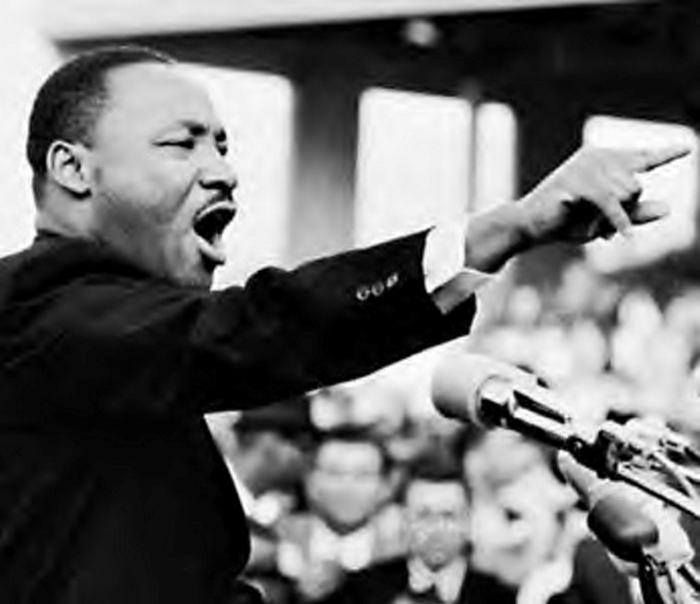
The Reverend Martin Luther King Jr., during the March on Washington for Work and Freedom, a major demonstration on August 28, 1963, where he delivered his historic I Have a Dream speech. Next Wednesday will be the 50th anniversary of his murder in Memphis,
English Article Goes Here
===
The Reverend Martin Luther King Jr. was killed 50 years ago (April 4) in Memphis, marking the bloodiest moment of what would be a 1968 that shook the United States and various parts of the world. Half a century later, this country is in the midst of a reactionary wave that has elevated a white supremacist backed by the Ku Klux Klan to the presidency, almost enough to make fun of King’s famous dream.
But it is worth remembering that King, when he was assassinated, was no longer just the man with a dream of racial equality, but a Nobel Prize winner and international moral authority who had dared in his later years to question and condemn his country’s economic and imperial system, including the war against Vietnam.
King went to Memphis, in the southern state of Tennessee, to support a union garbage workers strike in the name of economic and social justice. At the same time, he was organizing a national mobilization called the Poor People’s Campaign to demand economic rights for the underprivileged of all races and colors, a fundamental change in the U.S. capitalist system.
In the official rites and celebrations that King receives each year, it recalls his famous I Have a Dream speech, which he gave in 1963, but they almost never mention the radical message at the end of his life.
In 1967, King told a civil rights organization that the movement must address the issue of a restructuring of American society as a whole, adding that doing so meant coming to see that the problems of racism, economic exploitation, and war were all linked. These are interrelated evils. On the issue of economic injustice, he did not limit it to a racial issue: Let us be dissatisfied until the tragic walls that separate the outer city of wealth and comfort from the inner city of poverty and despair are destroyed by the battering rams of the forces of justice.
A few months earlier, he commented at a meeting of a civil rights organization: I think it is necessary to realize that we have moved from an era of civil rights to an era of human rights (…) we see that there has to be a radical redistribution of economic and political power…’.
Fifty years later, despite major changes in the country’s laws and regulations around institutional racism, crowned by the election of the first African-American president and what that means in a country founded on the backs of slaves, in essence, little seems to have changed.
An AP/NORC poll last week found that only one in 10 African Americans think the United States has met the goals of the civil rights movement half a century ago (35 percent of whites believe it has) after two rounds by an African-American president.
Fifty years later, new generations are continuing the fight against economic inequality, which has reached a record level in almost a century, with 1 percent of the richest families controlling nearly twice the wealth of 90 percent of the poor.
Fifty years later, incidents of official violence provoke fury. Impunity prevails as before, and indicators of segregation and racism multiply along with, and part of, the official anti-immigrant policies. Not to mention militarism in a country that has been in its longest wars in its history hoping to forget Vietnam.
But in the face of this, 50 years later, King’s echoes are heard all over the country.
Teachers in Oklahoma will begin a strike this Monday, following the triumphant example of their West Virginia peers, demanding not only a living wage and respect for their work – as they did 50 years ago in Memphis – but also greater investment in public education, especially to serve the poor and minorities; their counterparts in Kentucky (where teachers declared themselves sick by closing schools in 26 counties last Friday), Arizona and Wisconsin
African-American Rev. William Barber, famous for his Moral Mondays movement in North Carolina in 2013, which fought state initiatives to reduce spending on education and healthcare and to overturn some electoral rights, is resurrecting King’s Poor People’s Campaign this spring, and declaring, as his predecessor, that this is a moral issue.
MLK Dreamed of a Different America

Recalling the Memory of a Man Who Dreamed of a Different America 50 years ago.
Martin Luther King was honored in many places around the world today on the 50th anniversary of his murder.
Author: International Editor | internacionales@granma.cu
April 4, 2018 21:04:51
WASHINGTON: The life and work of Martin Luther King, a symbol of the struggle for civil rights in the United States, was remembered in the United States and much of the world today.
The murderous bullet that killed the renowned Baptist pastor in Memphis, Tennessee, on April 4, 1968, deprived humanity of one of its most tireless activists, who has since become an example to many of those who dream of a better world, reports Prensa Latina.
King dedicated his life to demanding an end to discrimination in the United States, where hundreds of years after the war of independence, blacks could not access certain places and had no right to vote.
He was also a harsh critic of the Vietnam War.
Despite the public notoriety he achieved, the activist was investigated and harassed by the FBI. In recent years, the real extent of the official political persecution of his movement, which included wiretaps of private calls and the spread of unfounded rumors, has come to light.
This Wednesday, personalities from around the world remembered his historic speech on the Lincoln Memorial esplanade in Washington, D.C., where he spoke the historic phrase “I have a dream.”
Half a century later, many of their demands remain unfulfilled in the United States, where discrimination and differences between blacks and whites continue to be a daily reality.
King’s granddaughter, Yolanda Renee, recently climbed on a platform to remember the Baptist pastor’s words when he asked that “his four little children be judged not by the color of their skin, but by the content of their character.
“I have a dream where we’ve had enough and where this world is one free of weapons. Period,” said the nine-year-old.
For his part, the president of Venezuela, Nicolás Maduro, recalled the legacy of the American social leader in a message published on Twitter.
“Martin Luther King was shot in the head in 1968 while greeting his followers in Memphis, Tennessee. Venezuelan young people must know their struggle and their dreams for us to make them a reality,” Maduro said.
Meanwhile, in Cuba, he was honored in a monument erected to his memory in the central park of 23 y F in the Vedado neighborhood.
The memorial event, organized by the Memorial Center that bears his name, opens a broader agenda of activities to be carried out this year related to the event.
Victor Fowler, director of the Centro Cultural Dulce María Loynaz, said Martin Luther King was an example of commitment and strength.
MLK: When a Dream Doesn’t Die

MLK, Jr.: When a Dream Doesn’t Die
Fifty years after the assassination of Martin Luther King Jr., the United States is still convulsed by racial inequality, but hope also remains.
 By Marylín Luis Grillo
By Marylín Luis Grillo
digital@juventudrebelde.cu
Posted: Wednesday 04 April 2018 | 09:35:06 PM
A CubaNews translation.
Edited by Walter Lippmann.
It was a single shot from a Remington-Peters rifle. Martin Luther King Jr. had fallen in Memphis, Tennessee.
Hours earlier, in a sermon, as if in anticipation of the bullet that tried to quell his throat, he had said to the congregation of the city: “We have difficult days ahead of us […] Like everyone else, I would like to have a long life. […] But that doesn’t worry me now. I just want to do God’s will. And he has allowed me to climb to the top of the mountain. And from there I saw the promised land. I may not get to her with you. But I want you to know tonight that we, as a people, will reach the Promised Land. And I’m happy about it. Nothing worries me.
Luther King, who at the age of 39 had won the Nobel Peace Prize, had led a non-violent struggle for the civil rights of the African-American community, which had become the banner of hope… King did not die, because dreams do not die, they only come true.
The results of their struggle are not yet complete. Fifty years after his murder, the United States is still convulsed by inequality. The latest statistics illustrate that African-Americans suffer three times as many expulsions and school dropouts, their average household income is half that of white families, and with only 13 percent of the population, El País reported, they account for 40 percent of drug arrests.
A study by the Inequality of Opportunity Project also concluded that racial income disparities are one of the most persistent issues in American society, and that the racial identity to which one belongs marks the opportunities for study, work, salary levels, and social advancement from generation to generation.
Black people are also three times more likely than whites to be victims of police in the United States, and in 2015 alone, for example, with Barack Obama in the White House, law enforcement officers killed more unarmed blacks than armed whites. Faced with an Afro-descendant, the trigger is pulled without much attention.
Police repression, increasing inequality, debates in society about the role of identity groups, and Trump’s racist rhetoric are some of the factors that have led to the resurgence of movements like the National Association for the Advancement of Colored People (NAACP) and the birth of others like Black Lives Matter.
“No Justice, No Peace” said one of the posters that flooded the streets of Sacramento a week ago protesting the death of another black man by police, 22-year-old Stephon Clark, who was shot down in the Californian capital on suspicion of breaking car windows and running around with a cell phone in his hand, which officers said they mistook for a gun.
Police opened fire up to 20 times on Clark and eight bullets hit him, seven from behind. The video of the arrest hardly shows whether the young man was approaching the officers or not. They do not order him to freez, or to lie on the ground, after the first order to show his hands, they immediately shout “gun” and shoot. The city has been shaken up again, but it is not enough.
This is a good time to remember Luther King. Less than two weeks ago, her nine-year-old granddaughter, Yolanda Renee, was repeating the mythical words “I have a dream. She called for “a world without weapons”. His father, Martin Luther King III, son of the pastor, announced Friday the launch of a global initiative to encourage young people to focus on non-violence to resolve their conflicts.
The struggle continues, but it must be carried to its end; “from the mountain of despair, a stone of hope,” Dr. King would say. He was the same one who never stopped spreading faith because he had died: no bullet can kill dreams.
Of the Dream and the Nightmare

Of the Dream and the Nightmare
Fifty years after Martin Luther King’s momentous visionary speech, African Americans continue to struggle to find the path to true equality.
 By Juana Carrasco Martin
By Juana Carrasco Martin
juana@juventudrebelde.cu
Published August 37, 2013 21:39:36 CDT
Updated: Thursday, September 21, 2017 | 10:25:08 PM
A CubaNews translation.
Edited by Walter Lippmann.
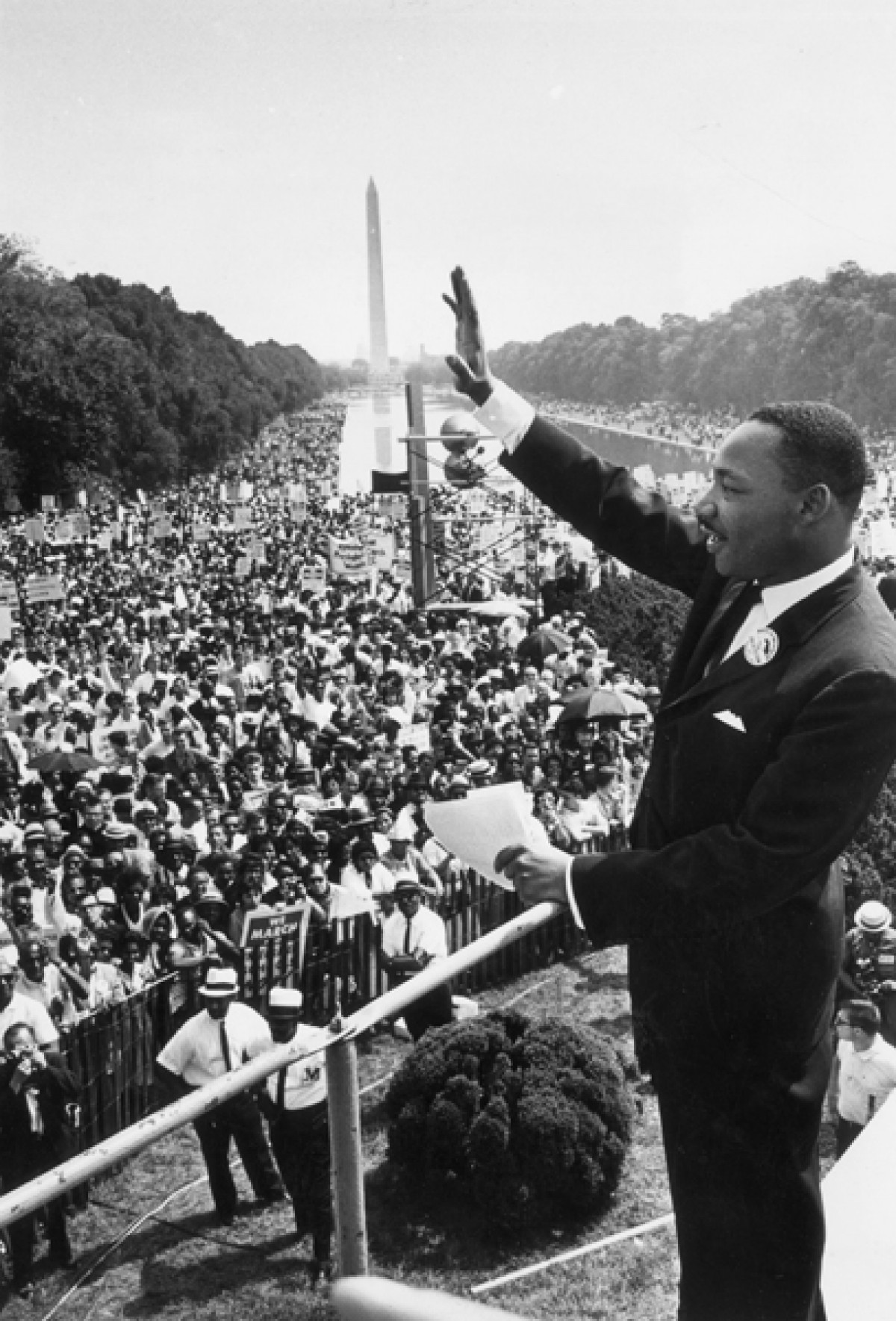
Martin Luther King greets the crowd at the Lincoln Memorial on August 28, 1963. Author: AP Published: 21/09/2017 | 05:38 pm
It was a blast, revalidating the struggle of many, raising the awareness of others and forming ranks in a social movement involving blacks and whites because it was for the civil rights of all. It also awakened those who were still lethargic after hundreds of years of outrage and submission.
On August 28, 1963, the 100th anniversary of the Emancipation Proclamation for black people in the United States, the end of slavery, was observed when a crowd, led by the Rev. Martin Luther King and other leaders of the black people’s struggle and social and labor movements, marched on Washington and gathered at the National Mall at the foot of the imposing statue of Abraham Lincoln.
“I have a dream,” he said in his speech to what he called the greatest demonstration of freedom in the history of the nation, and he called out with utter crudeness that a century later “we must face the tragic fact that the black man is not yet free. He was chained by segregation and discrimination, “living on a lonely island of poverty in the midst of a vast ocean of material prosperity,” he was “an exile in his own land.
The dream? that the words of the Constitution and the Declaration of Independence will apply to each and every American as a guarantee of the inalienable rights to life, liberty and the pursuit of happiness. These were denied to “citizens of color” who had been given a bounced check from a bankrupt justice. But this marginalized, humiliated, separated people, who were denied every opportunity, even the most basic, knew of their right to open the doors of justice, to cast aside racial injustice and to build “the solid rock of brotherhood.”
The time was urgent, warned Martin Luther King, and also alerted his people and the rest of the United States: “1963 is not the end, but the beginning” (…) “There will be no rest or tranquility in America until the black man establishes his citizens’ rights. The winds of revolt will continue to shake the foundations of our nation until the bright day of justice emerges.
Three national television networks, for the first time, covered the march for jobs and freedom in together. The message reached the entire nation that a melting pot was being said, the pot that had mixed all the peoples who had come to its shores and built a powerful country, but that was one of the great lies. The Black ingredient, even the original peoples, the “red skins”, had been taken out of society. That media coverage was proof that it was time for change.
There Joan Baez and Bob Dylan sang, as did the gospel performer, Mahalia Jackson, who carried the feeling of the crowd with I’ve Been ‘Buked and I’ve Been Scorned. Many spoke, including Joachim Prinz, president of the American Jewish Congress, recalling his years as a rabbi in Berlin under Hitler, who said – according to The Guardian – that his great people, who had created a great civilization, had then become a nation of silent spectators to hatred, brutality and mass crimes and cried out: “America cannot become a nation of spectators. America must not remain silent.”
On August 28, 1963, and Martin Luther King’s “I have a dream” speech, a door was opened. It was hardly mentioned in the 64,000 pages of debate and congressional hearings that gave way to the Civil Rights Act of 1964 or the Voting Rights Act of 1965, which put on paper what it should be and yet was not; but it was a touch of the target.
Enemies took it into account. Cointelpro, the program of espionage and infiltration into the social movements of the time, made him its target. William Sullivan, the FBI’s assistant director of domestic intelligence, recommended: “We must mark him now, if we have not done so before, as the most dangerous black man in the future of the nation.”
Hot summers came and their street uprisings, many more marches and actions, unity with the anti-war movement, and rejection of the Vietnam War, which they also used as their favorite cannon fodder for blacks and Latinos. Martin Luther King was in that fight for all.
Little by little there were achievements, even a middle class of “coloured” men and women emerged, their numbers increased in universities, they became professionals, their faces already appeared as leading figures in Hollywood films, they showed, even more, their value in the sports world, where the image of a black fist is vivid as a symbol of Black Power, the power of black people.
Blood flowed – that of Martin Luther King himself in April 1968, that of Malcolm X, that of George Jackson, that of many others – Mumia Abu Jamal is still in prison and those who chose more radical methods of struggle are being persecuted. Other leaders in an ongoing struggle were highlighted, as the Lincoln Memorial speaker said as the summer of 1963 ended: it was only the beginning…
And 50 years later, what?
Present at the rally at the National Mall on Saturday, August 24, 2013, which brought together no less than 100,000 Americans of all colors, generations and ideologies to commemorate the 50th anniversary of Martin Luther King’s oratory piece, were the parents of Trayvon Martin. He was the 17-year-old boy shot dead in the chest by a white vigilante in Florida on February 26, 2012. It took protest marches in many American cities and a lot of work to have the perpetrator arrested and put on trial, and almost now, in July, a jury of five white women and a Latina declared him “Innocent.” Not a few posters in front of Lincoln’s statue again called for justice for what is perceived as a hate crime.
Police in New York and other U.S. cities are accused of practicing stopping and frisking bystanders, most of whom are black or Latino, and preferably young, for no reason. They are stopped because of racial profiling. African-Americans make up seven times more than whites among the prison population, which is already the highest in the world. In the United States, it is known and recognized that they invest more in prisons than in schools….
Only 21 percent of their youth reach high school or college, compared to 37 percent of whites. Budget cuts in major cities declared bankrupt and in federal spending itself, that of the entire nation, affect the public school system and, of course, scholarships or university credits. It goes without saying that communities and neighborhoods where poor or low-income minorities live are among the hardest hit by teacher layoffs. During Barack Obama’s tenure alone, more than 300,000 school jobs have been lost – with a high proportion of these being African-American teachers and staff. Public education will be of even poorer quality, which means that there is no future sown there.
The unemployment rate in 2012 was 13.6 percent for the African-American work force, while the white unemployed made up 8.1 percent. Of the 45 million Americans who receive food aid because they are poor, more than 25 percent are black.
Barack Obama, the first black president of the United States will speak today, August 28, in honor of Martin Luther King. But it is well-known that the president is only an image in a House that is still white and protective of the interests of the powerful 1% against the 99% who – without distinction of race – have declared themselves in struggle and have also begun a path to close the gaps of class inequality, as the Occupy [Wall Street movement] which has been marginalized.
Now, in the southern states, even in other regions, electoral districts are being reconfigured and the black population is once again segregated from the vote, even having to pay to register. It also is the population with the lowest income, thereby discouraging voting. There is only one black senator among the top 100 in Congress, and 43 representatives in the House of Representatives, among 435…
Therefore, the validity of the thought of the civil and pacifist leader: “I have a dream: that one day this nation will rise up and live the true meaning of its creed. We hold this truth to be self-evident: All men are created equal.
Martin Luther King will continue: “Even though we face difficulties today and tomorrow, I still have a dream.”
Letter from Olga Salanueva, 1-26-2018
Letter from Olga Salanueva, 1/26/2018
By Olga Salanueva Arango (posted to Facebook)
Translated and edited by Walter Lippmann for CubaNews
Reflection by Olga Salanueva Arango
Dear friends:
I begin by clarifying that I have not been summoned by anyone, nor interviewed by anyone, nor cited by anyone; not even by the famous commission. I was surprised by the commotion over a comment that at first was intended to be a clarification for some friends, whose deductions in relation to the reasons for the exclusion of three of the Five seemed wrong. By following the suggestion of several of them, “to make my comment public to share it better”, the writing ended up exceeding the originally intended scope
I plead guilty to not being an expert on Facebook. I hope that at least those of my generation understand it. If I live long enough, I’ll try to make amends.
I did not consult with any of the Five, nor have I received a reprimand from any of them, including René. He respects my right to write on Facebook the few times I do it. I would have written it even if René was one of the two chosen, especially when, in that case, he would be in a difficult position in relation to his non-selected brothers. The Five are above this. I, on the other hand, am an earthly person, but like them revolutionary and proud of my militancy. This is very clear, because people who I thought were friends have hurt me insinuating the opposite. Paraphrasing the film, even if I were “the worst of all”, I would never be counterrevolutionary.
[ This is an allusion to a film about Sor Juana Ines de la Cruz. The title of the film is the famous phrase “Yo, la peor de todas” with which she signed a letter to the Archbishop.]
In passing, I also clarify that I maintain my opinion that the five should have been on the ballot, that the vanguard demonstrated should be with their voices and their votes in the Assembly. I still think it unfair to distinguish between them, and it seems a mistake to have done it. I did not fight so many years just for René, but for the five as a unit, and it hurts me that someone would try to separate them, even if he does not really realize what it is doing. This feeling is still very strong in me, and I would not be myself if I said that with two in the Assembly the five are represented (which confirms that this writing is not the result of convocation, or interview, or a summons, not even by the famous commission).
If I write this, it is because I think we should put this issue to rest and take care of what matters: The Revolution. I do not care at all what the Herald does or does not do. The Herald has spent the last 60 years trying to destroy the Revolution without success. It will continue to do so, with the same lack of success, either with this issue or with any other. I am proud that they have written several times about me, and never well. Here I am, alive and kicking, and happy with my family together. I know closely that the five, far from being offended, had fun with their pamphlets in the hole, when they had few entertainment options.
I would like to think that, after all, this issue has produced a useful, very interesting and necessary discussion. If my writing provoked it, it was because it was already in the air. Thanks to those who supported us and said so many things worthy of thanks. Thanks also to those who respectfully disagreed with our opinion. To those who were disrespectful and aggressive toward me, or were dedicated to manipulating my opinions, I thank them for allowing me to know them better so I can cross them out of my list of friends.
Now the issue is what to do: To keep moving forward. Doing our duty to the best of our ability. Go to vote. Respect the system we have and not let our reaction to its imperfections make a dent in its results. I would like to urge all those who have thought about putting the five on the ballot not to do so. Remember that this would annul the vote, and, in doing so, those friends would be doing what our true enemies want. Let’s not correct what we consider an error with a bigger error. None of the five, inside or outside the candidacy, would approve of that.
Nor is it necessary to wait for someone to withdraw their candidacy in favor of one of the five. This would not be fair to that candidate or even legal. On the other hand, it would imply a challenge to the work of a legally-constituted commission. Although we do not agree with its decision regarding the five, we must respect its work. With the same spirit with which we supported the five, I ask that we unite to make this election another victory for the Revolution. We can keep arguing afterwards.
Let’s show, like Felix Dzerzhinski, a cold mind and a heart ablaze. I want to sincerely congratulate all the deputies. They will have been elected in each municipality of the country by more than half of the votes, which allows them to legally represent the inhabitants of that municipality. My vote will be united, although I will continue to miss three more. Remember that I am still earthy and stubborn. Maybe that’s why I am, and I will be until death, revolutionary.
Revolutionary always.
Olga Salanueva Arango.
Colin Kaepernick Named Man of the Year

Colin Kaepernick Named Man of the Year by GQ magazine.
November 13, 2017
Translated and edited by Walter Lippmann for CubaNews.
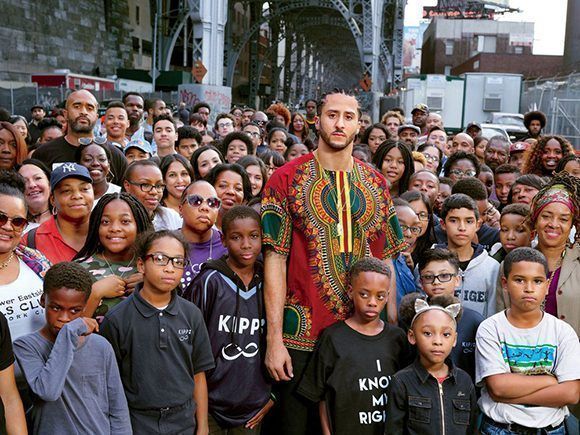
His fight for the rights of African Americans has cost him his career in the NFL, but Colin Kaepernick remains a symbol for activists. Photo: @ GQMagazine / Twiiter.
For a long time, Colin Kaepernick became a true symbol in the United States against the racial violence that the policemen inflict on black people, and that has led to murders.
The American football player’s stand cost him his career in the NFL, since he remains without a team and he himself denounces the fact that he is being made the victim of a “conspiracy” by the competition.
In spite of this, the icon does not abandon his struggle, and has obtained the recognition of being named “man of the year” by GQ magazine.
Kaepernick turned into an icon.
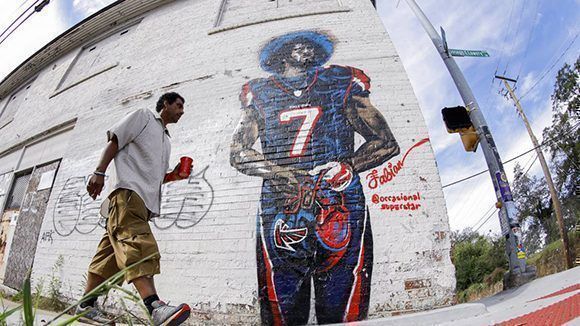
Kaepernick is a symbol in the United States. Photo: EFE
Kaepernick, turned into an icon
Attacked directly by Donald Trump, and seconded by almost all of his NFL teammates who popularized the gesture of kneeling while the US national anthem was played, Kaepernick is already almost a martyr of the racial struggle.
The ex-Quarterback of the San Francisco 49ers will express with words his fight in a book. And presumably that, his word, is the most valuable and complicated thing to obtain from him.
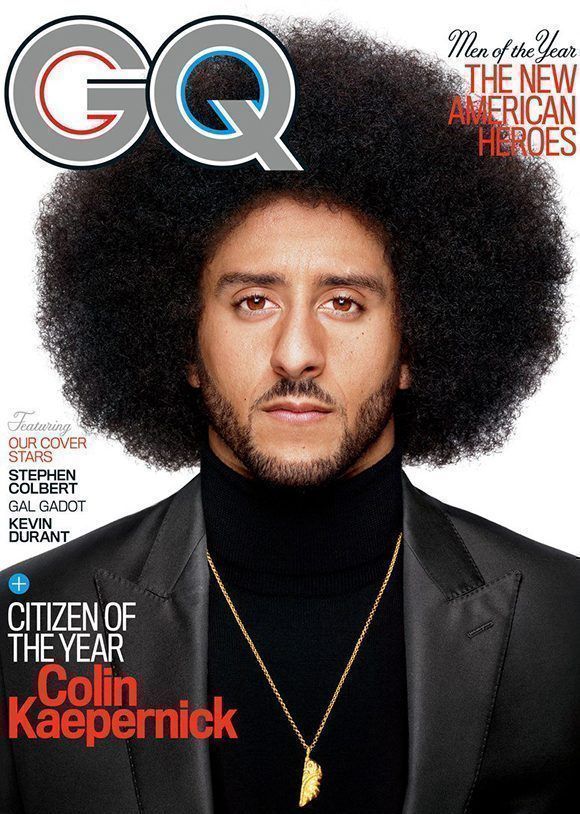
Colin Kaepernick, cover and “man of the year” according to GQ magazine. Photo: GQ.
Good proof is that he has even preferred not to give an interview to GQ for that report in which he is named “man of the year”, although at least he has had the deference of posing in various photos through the streets of Harlem, in New York.
The magazine announced that Kaepernick will be featured on its cover and will be honored as “man of the year”, highlighting his social and racial struggle and his already legendary gesture of August 27, 2016, when he refused to listen standing to the United States national anthem.
Take Back the Workplace 11/12/2017
#MeToo Survivors March – Take Back the Workplace
March and Rally, Hollywood, California
November 12, 2017
Text and dozens of photos by Walter Lippmann.
Hundreds of women and men came out on short notice today to protest sexual abuse and rape. Called by local organizations and a group of female farmworkers, an estimated 500 people assembled in the heart of the Hollywood tourist district. They marched to the headquarters of CNN where a militant rally was held, then marched back to the starting point.
The crowd was lively, well-organized and very spirited. Local feminist and activist groups, as well as a leadership group of female farmworkers who drove 100 miles from Ventura county, made forceful statements, including speaking from personal experience. Speakers included figures in the Hollywood entertainment industry as well as local activists. The farmworkers carried signs in Spanish, and their leader spoke, in Spanish, to the assembled protesters. The event was very diverse ethnically.
One particularly striking aspect was that most of the signs were hand-made.
Police were present and well-mannered. Lots of media people were the and reports went out in the LA TIMES, LA OPINION (Los Angeles’ main Spanish-language daily) very quickly. I’ve been going to demonstrations since 1961, and except for that first march, this was the first time I have EVER been to a protest where I did not know one single individual.
Here are a series of photos I took at the demonstration.
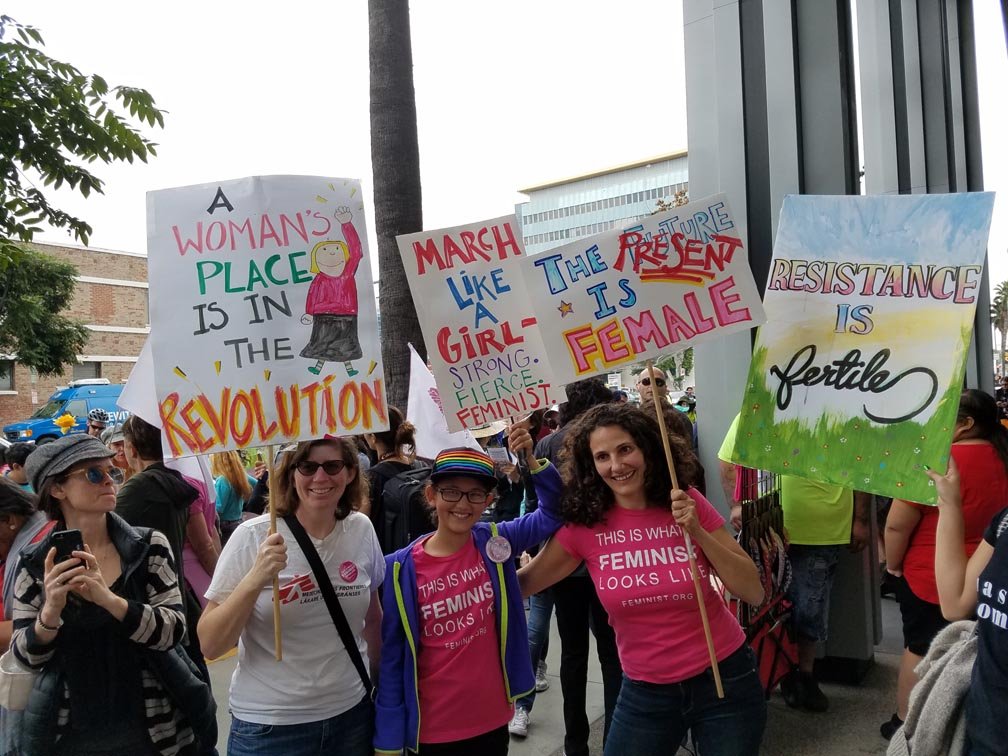
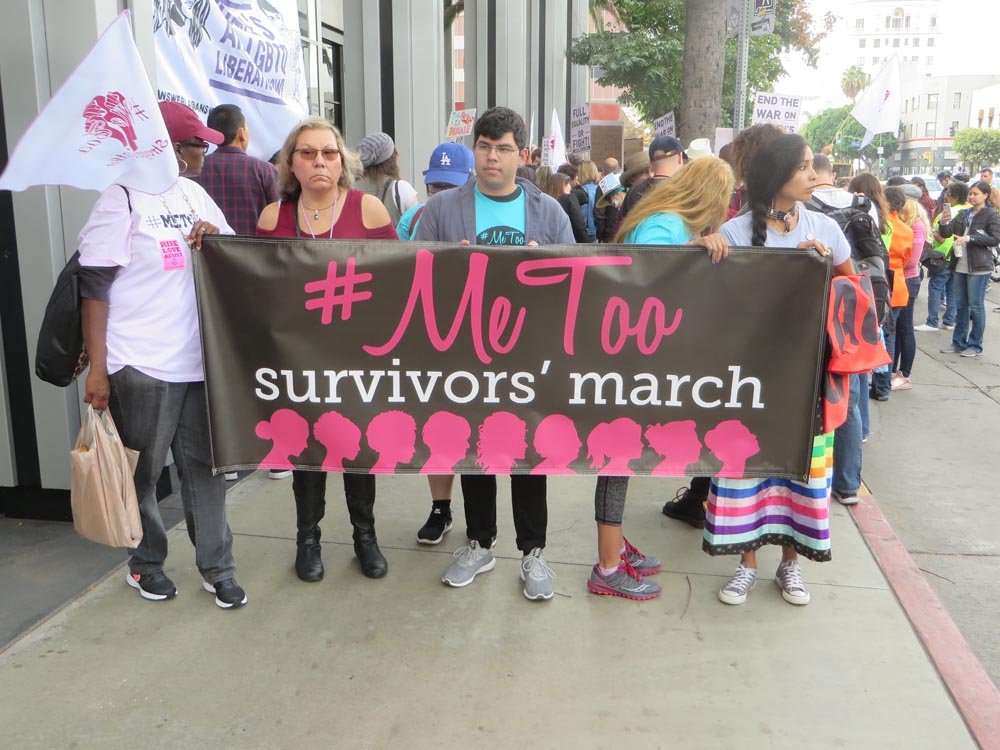
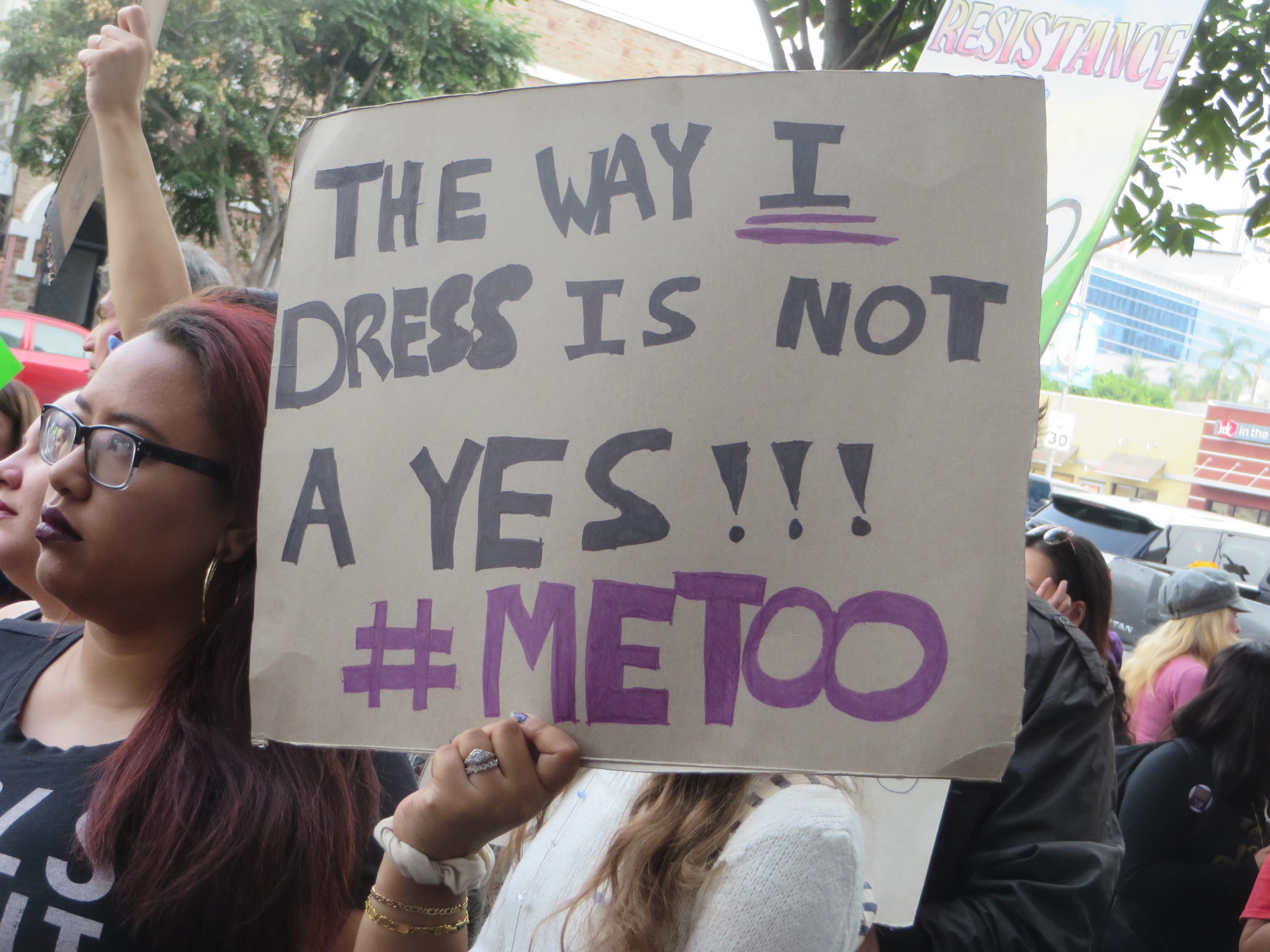
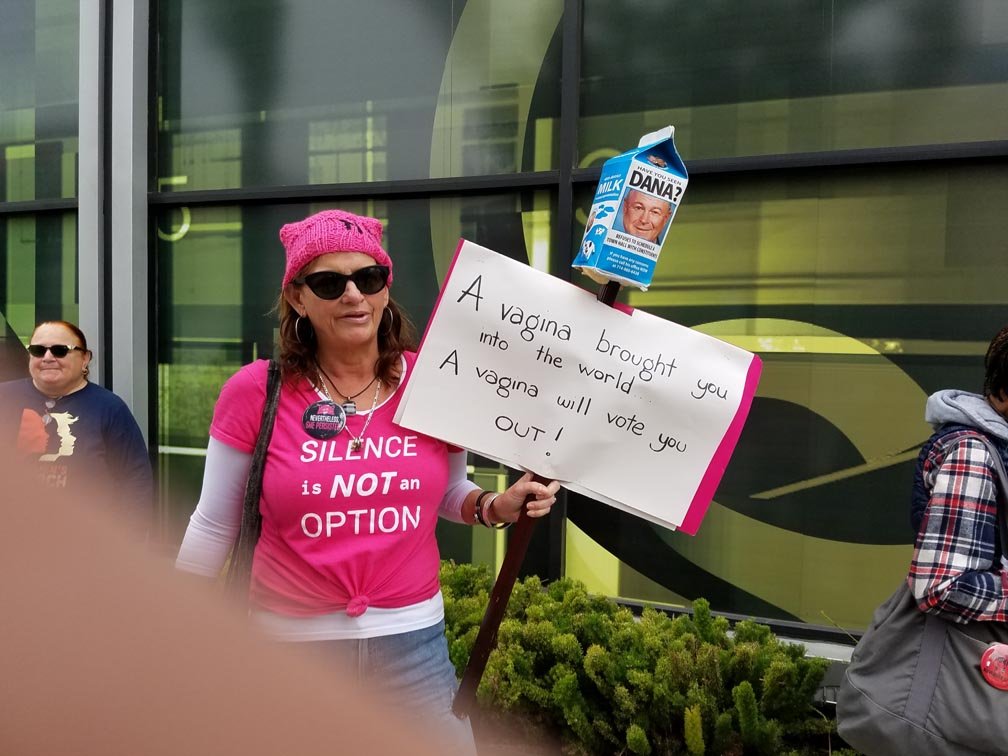
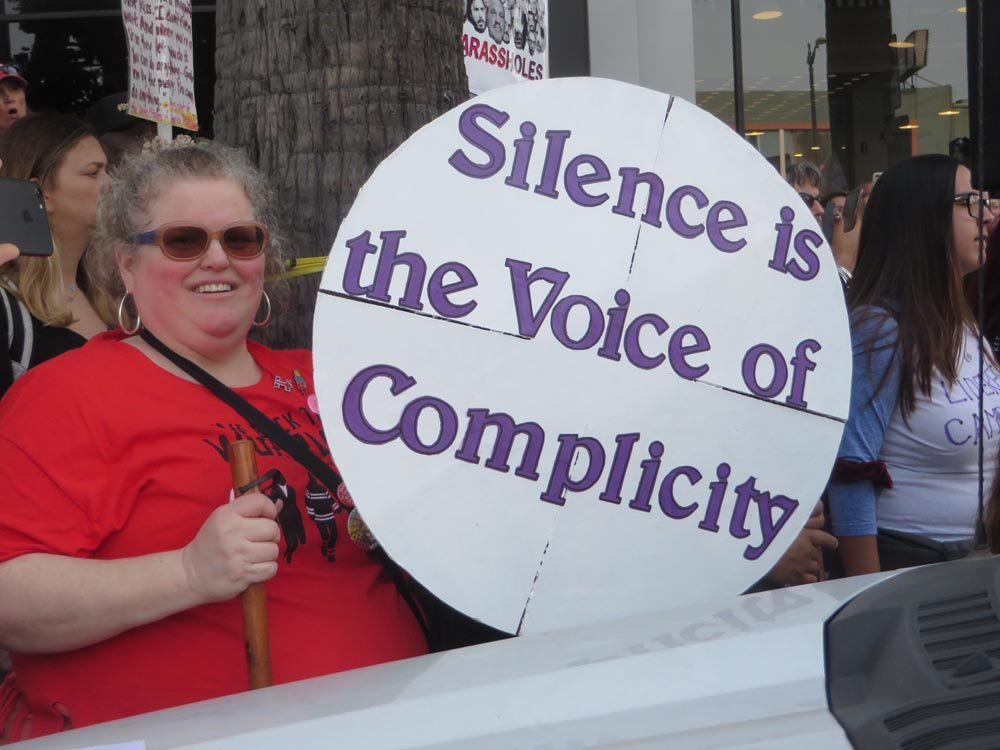
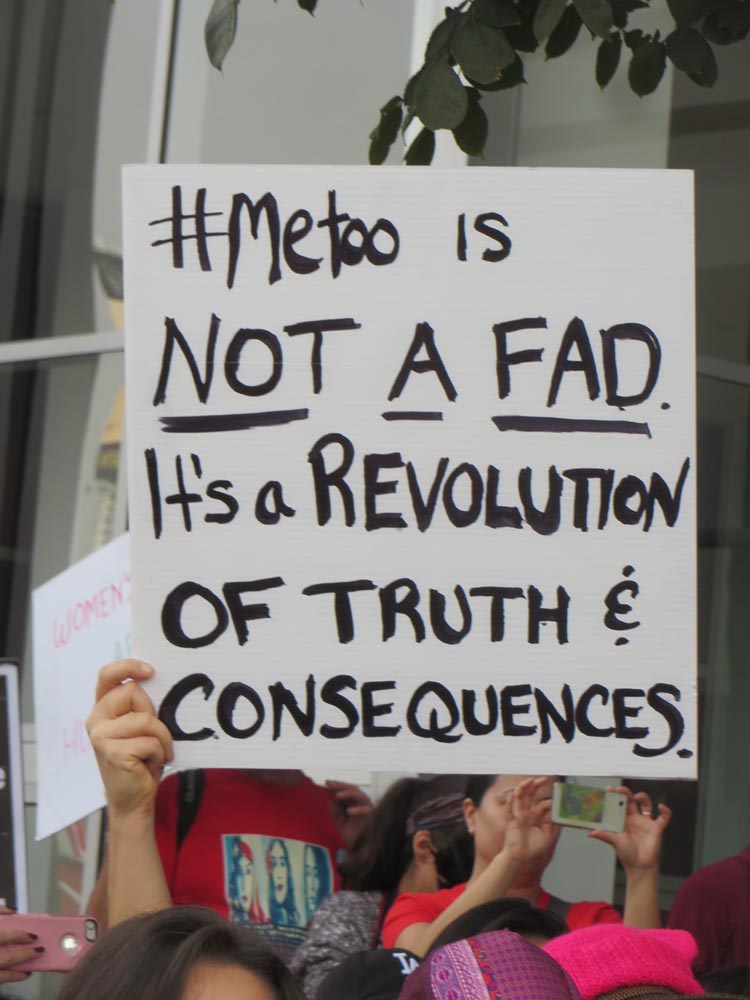
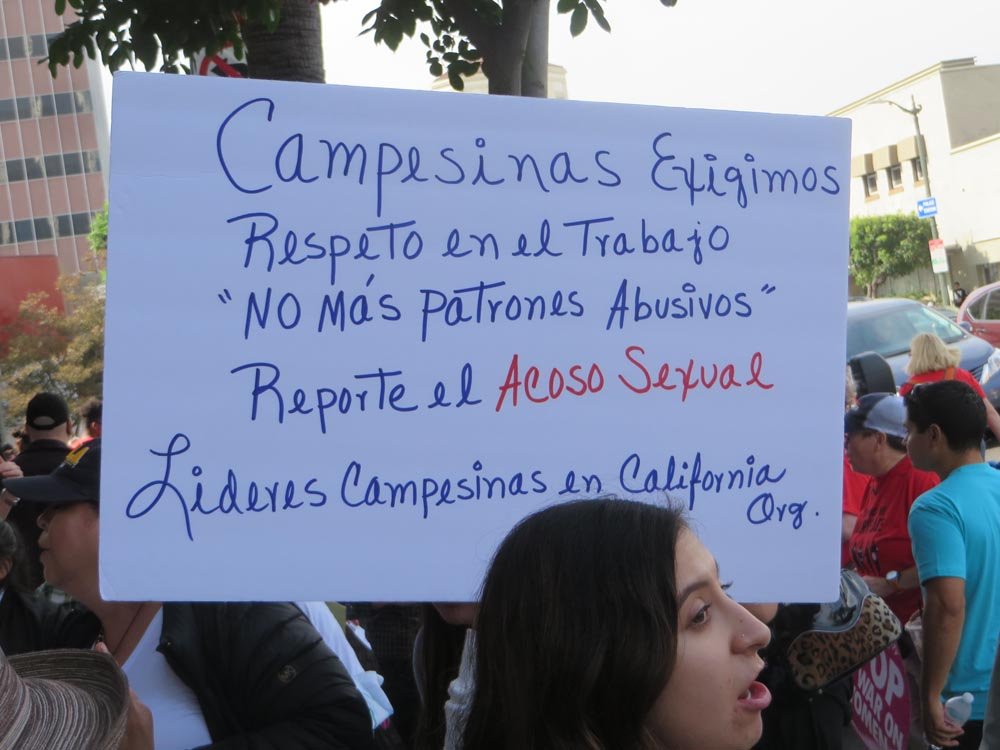
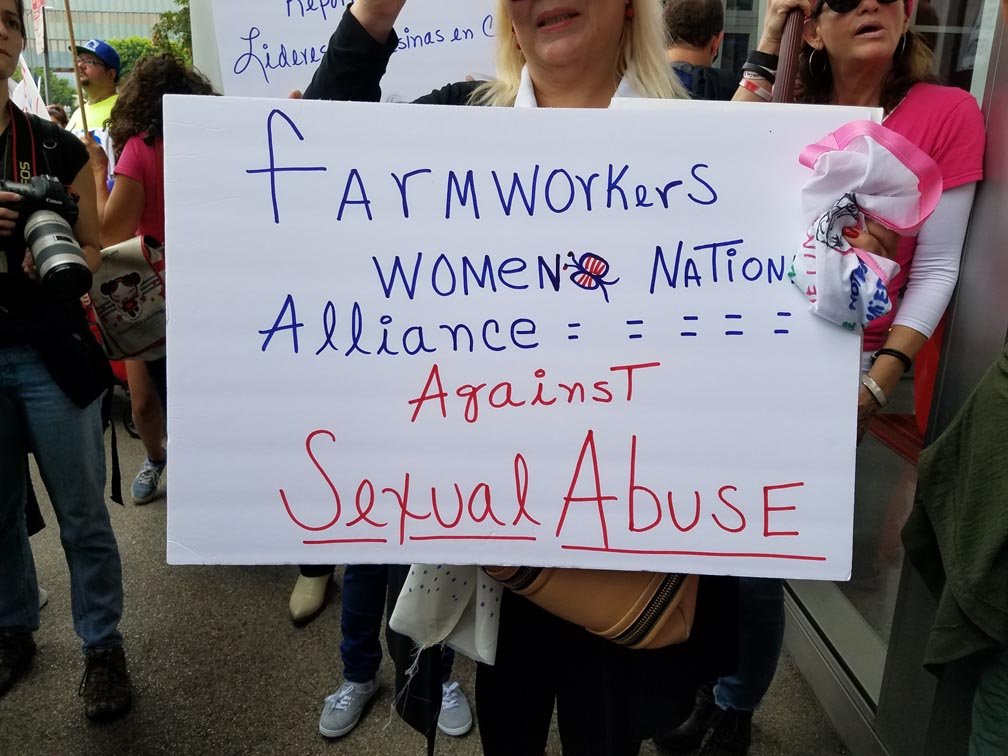
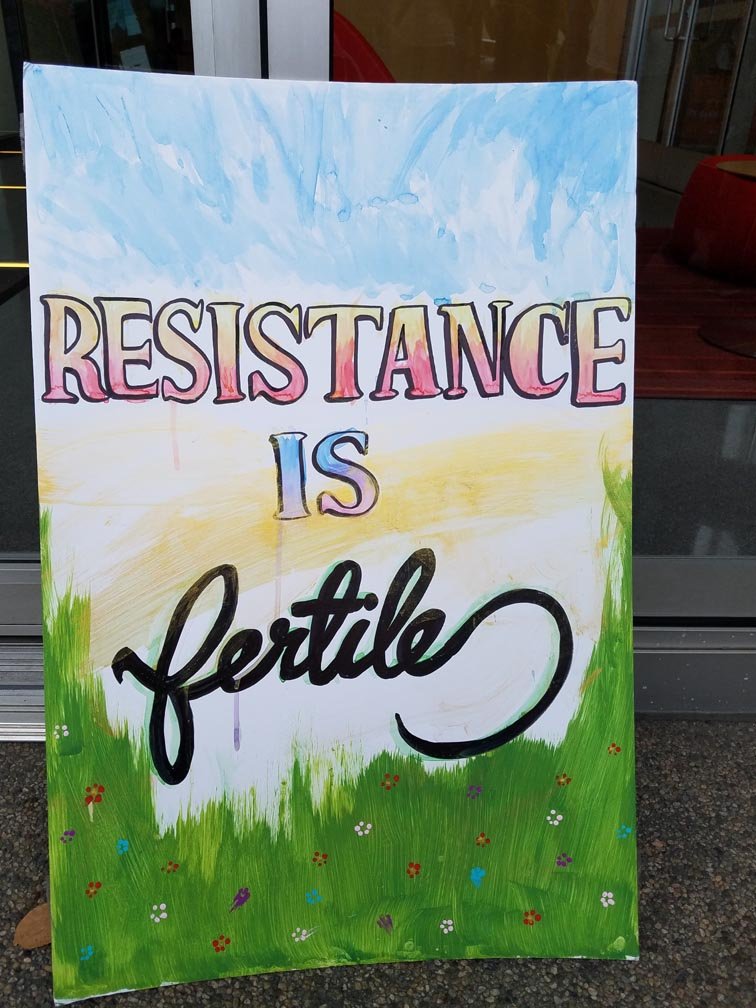
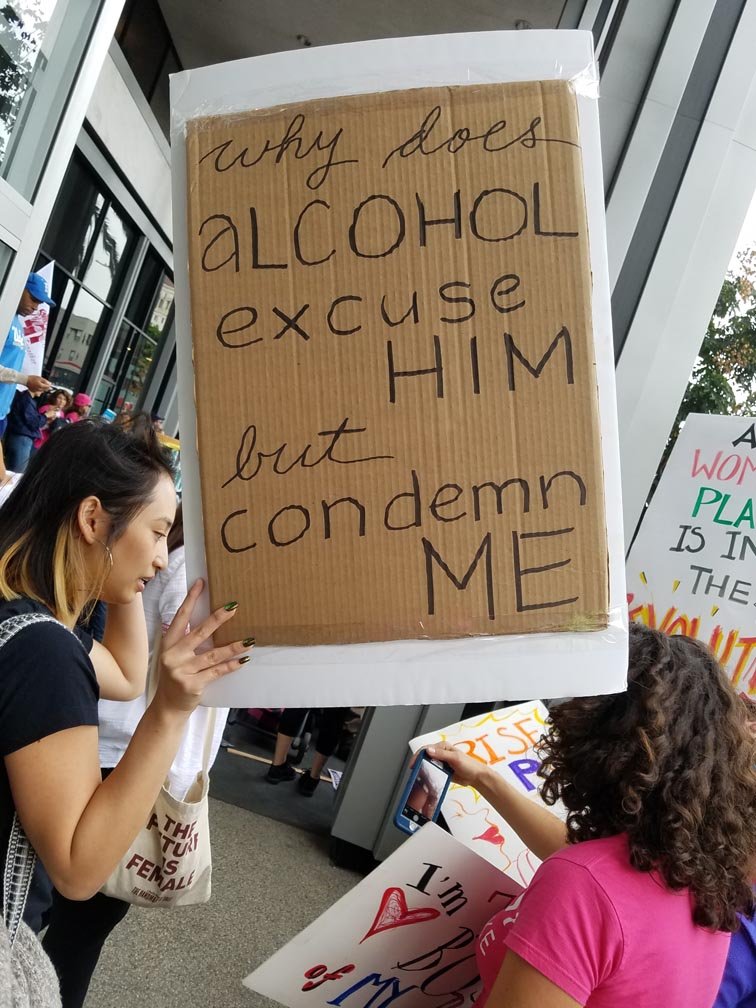
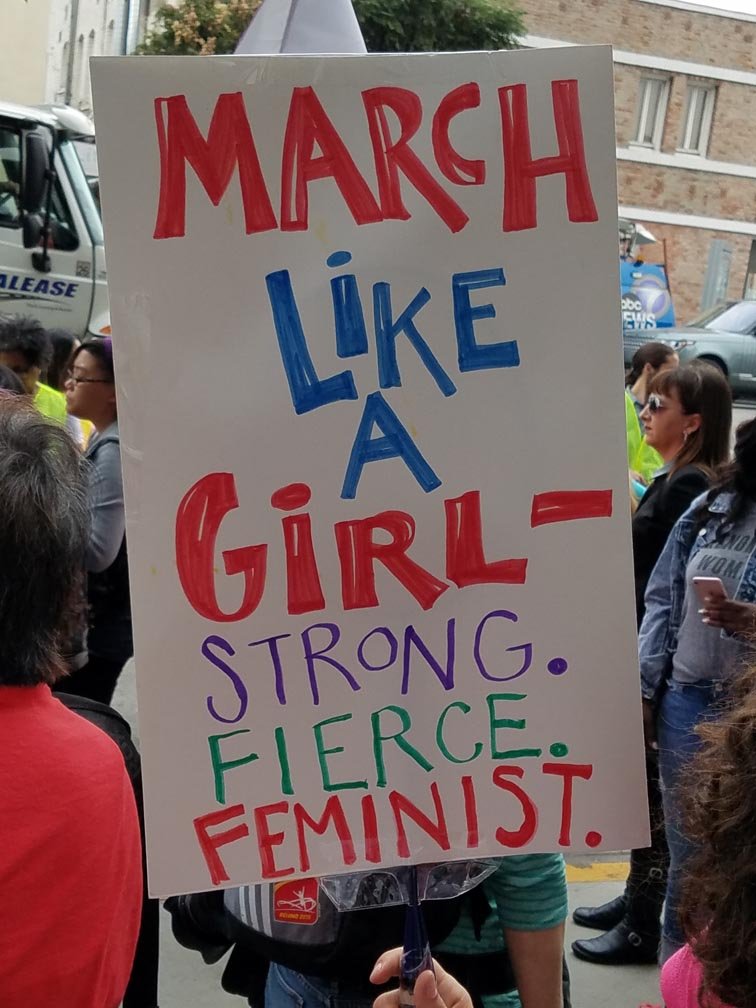
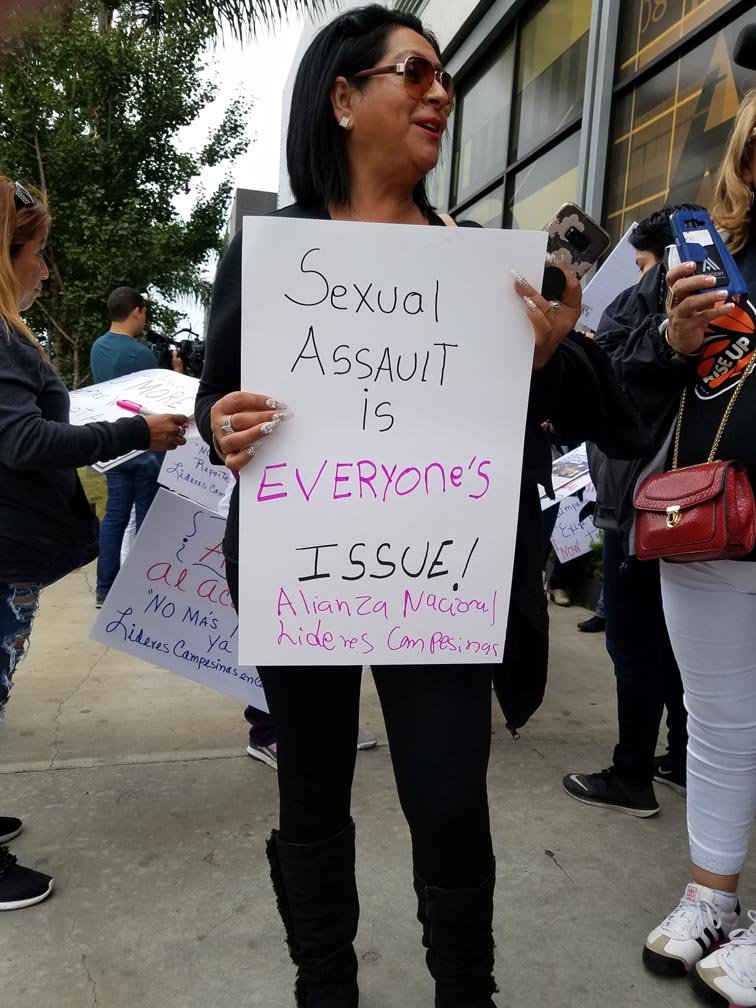
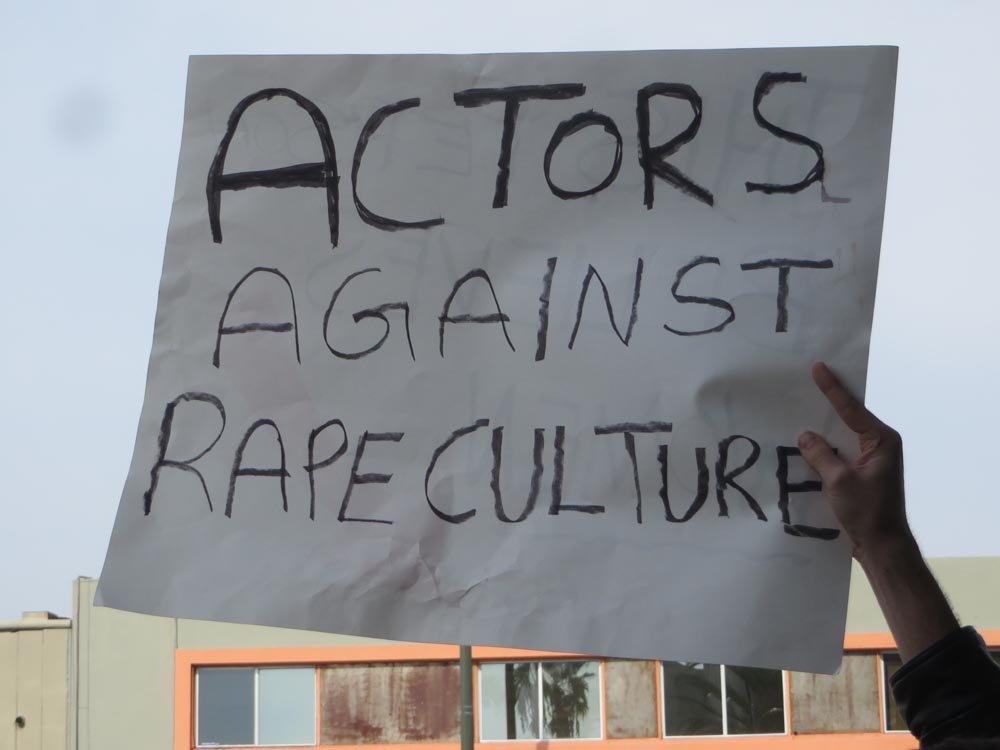
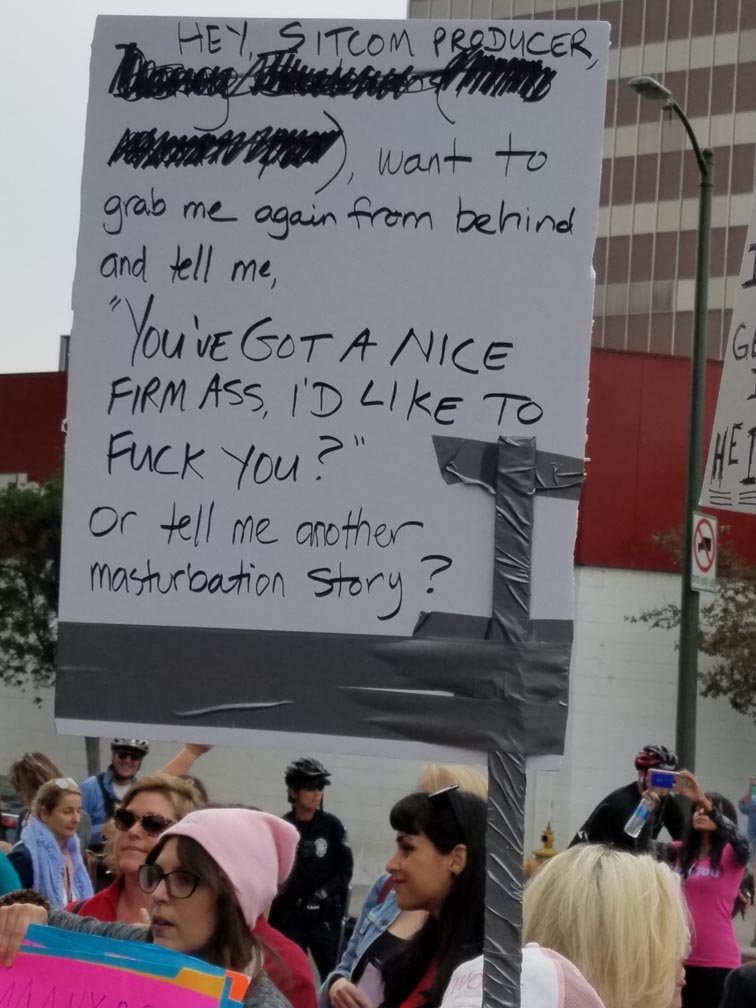
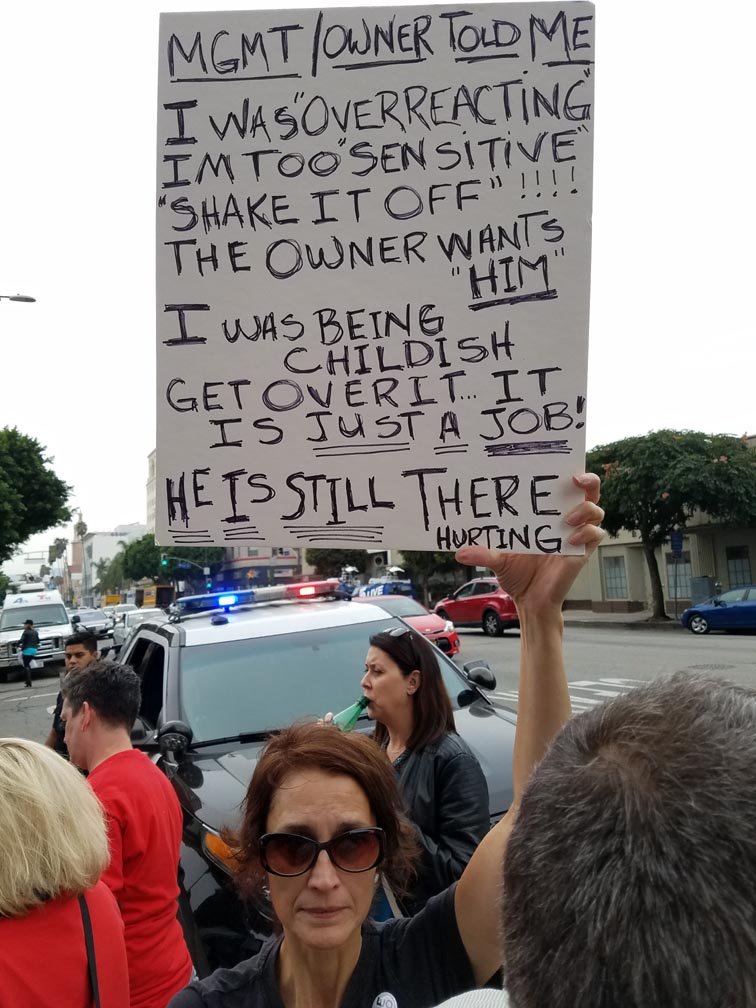
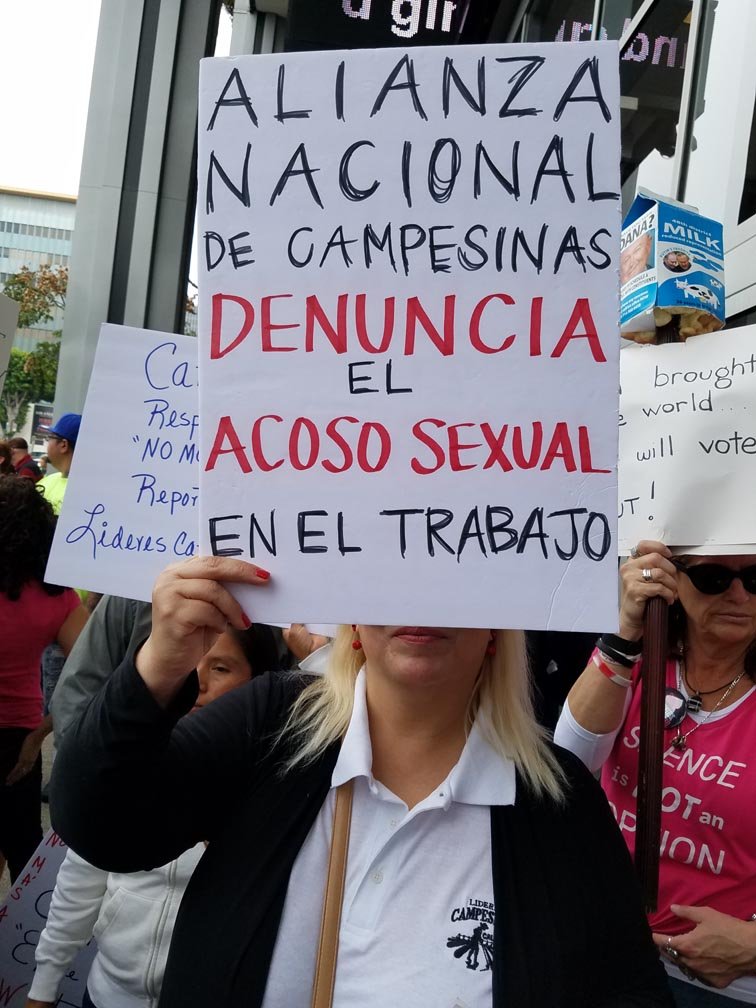
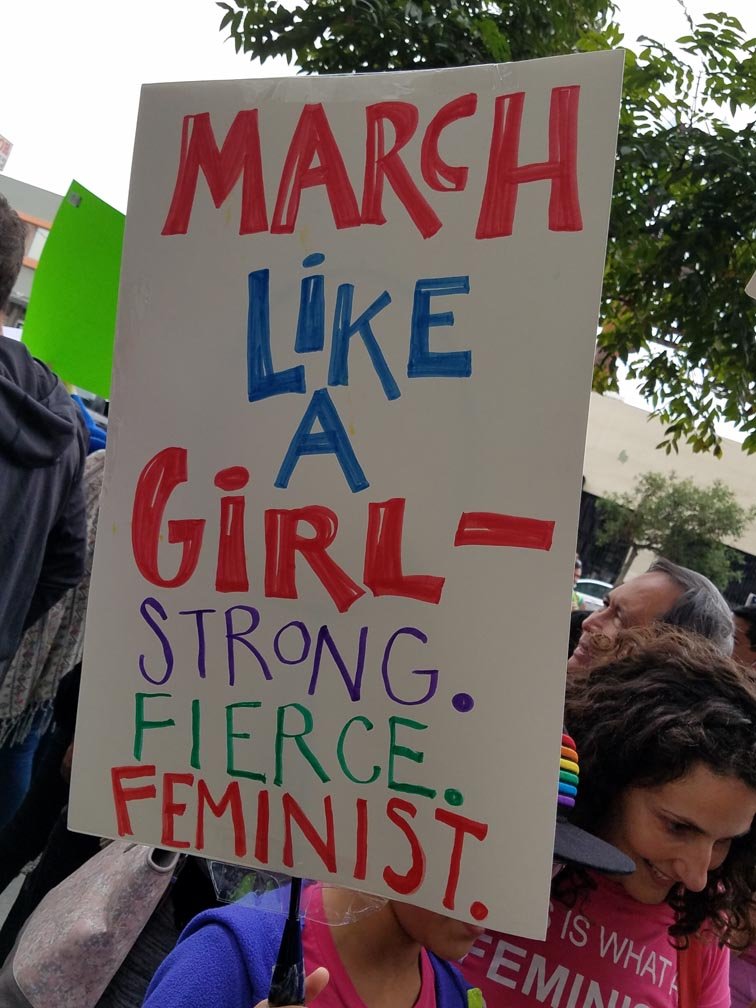

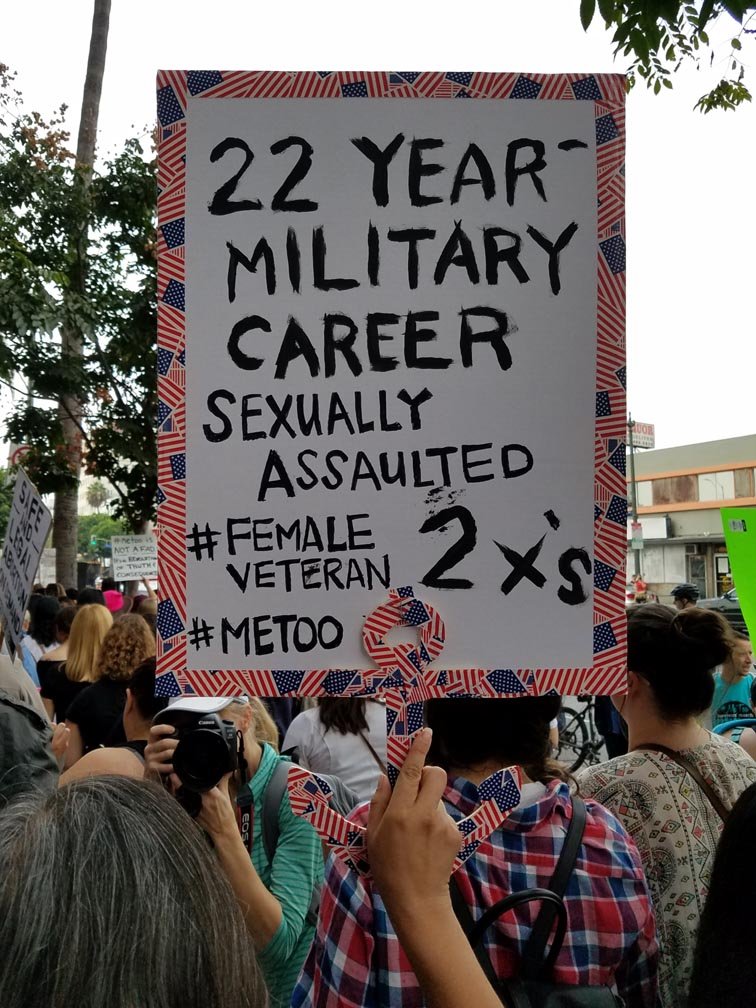
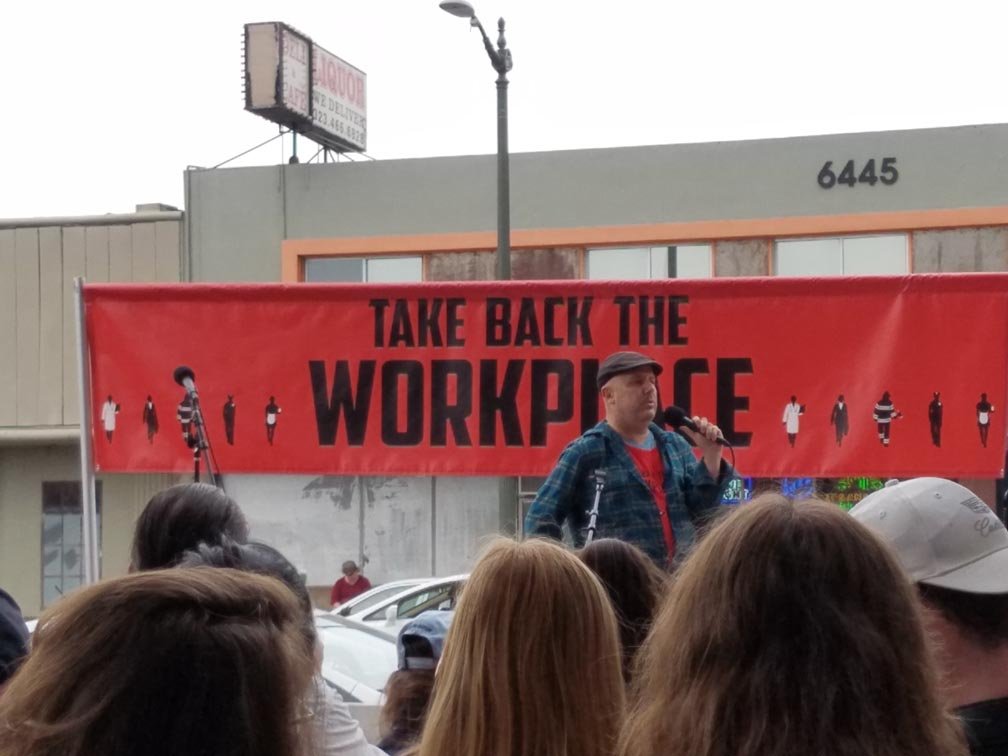
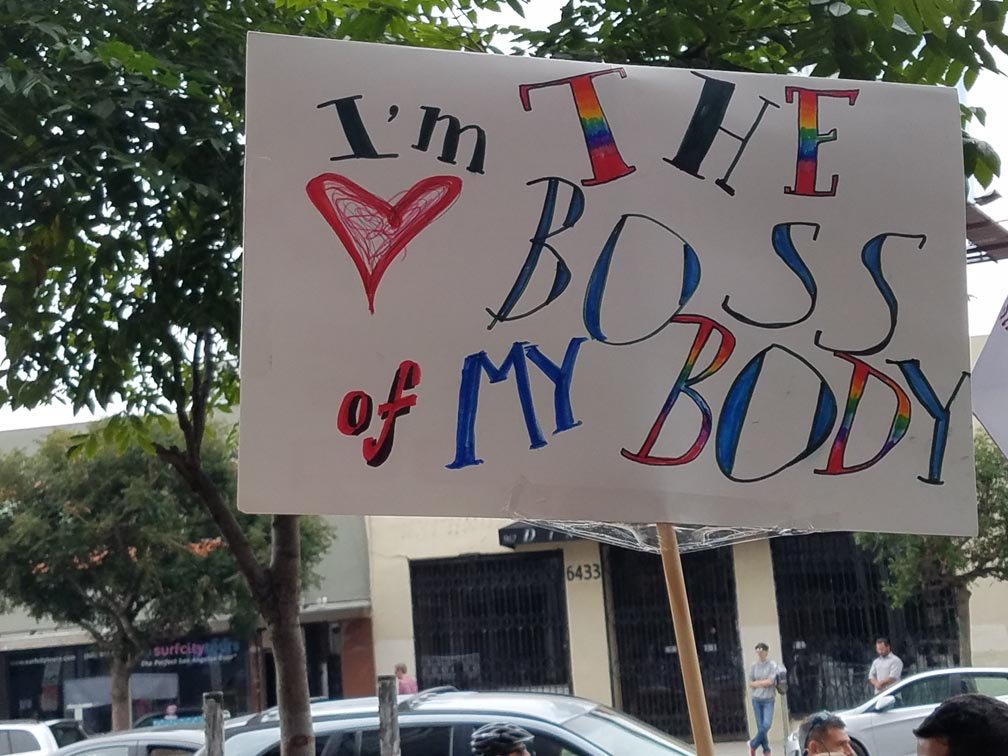
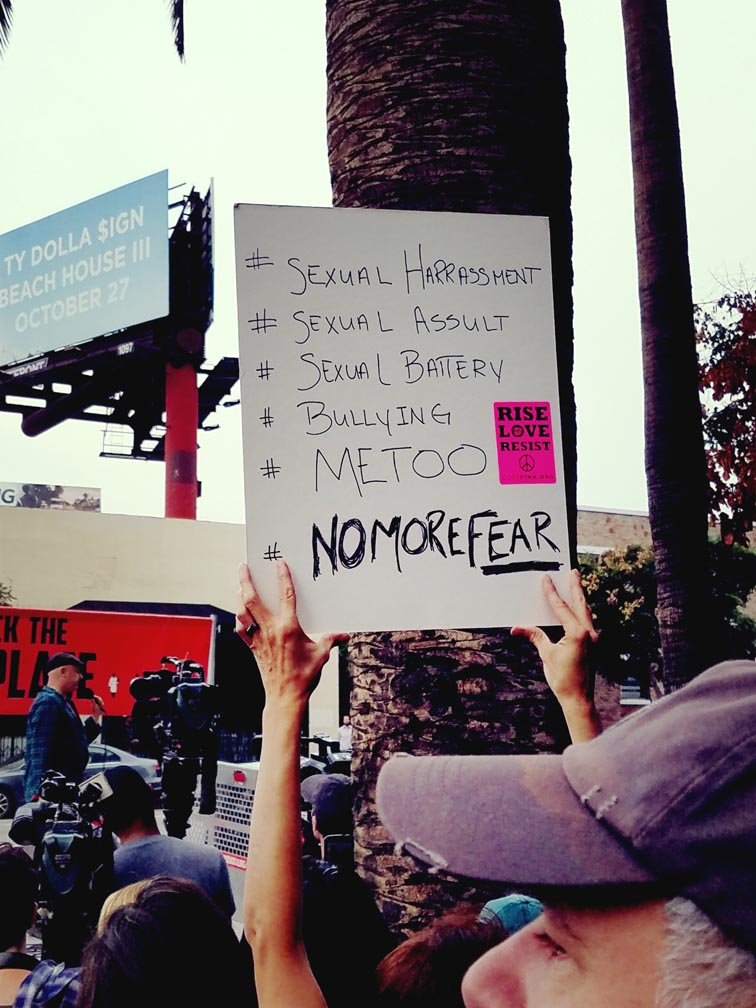
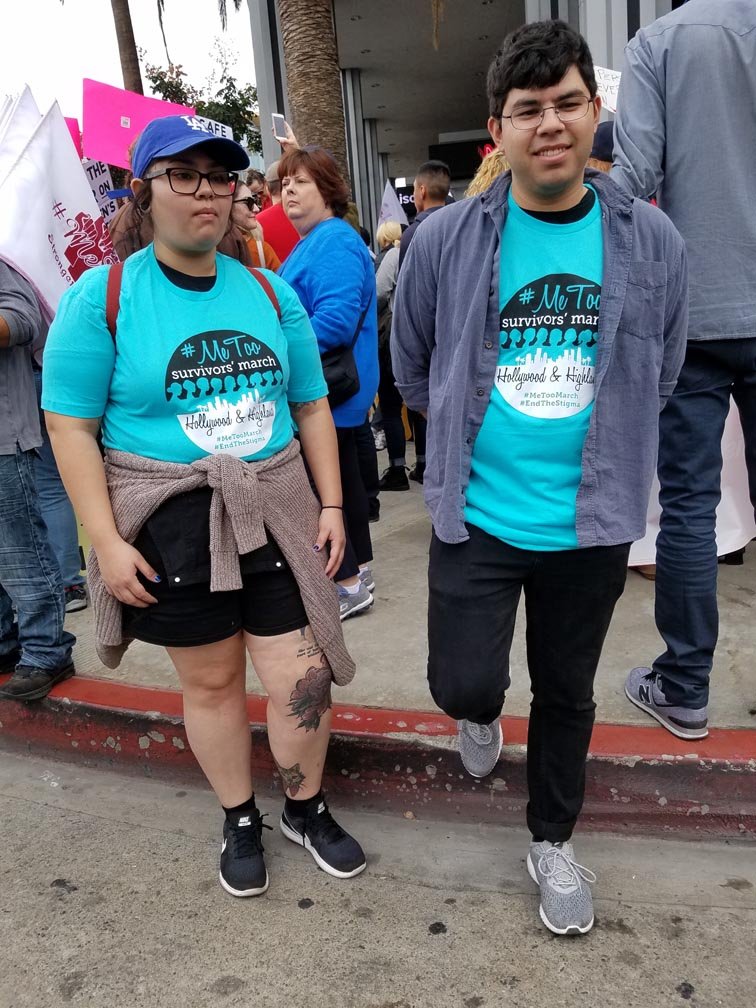
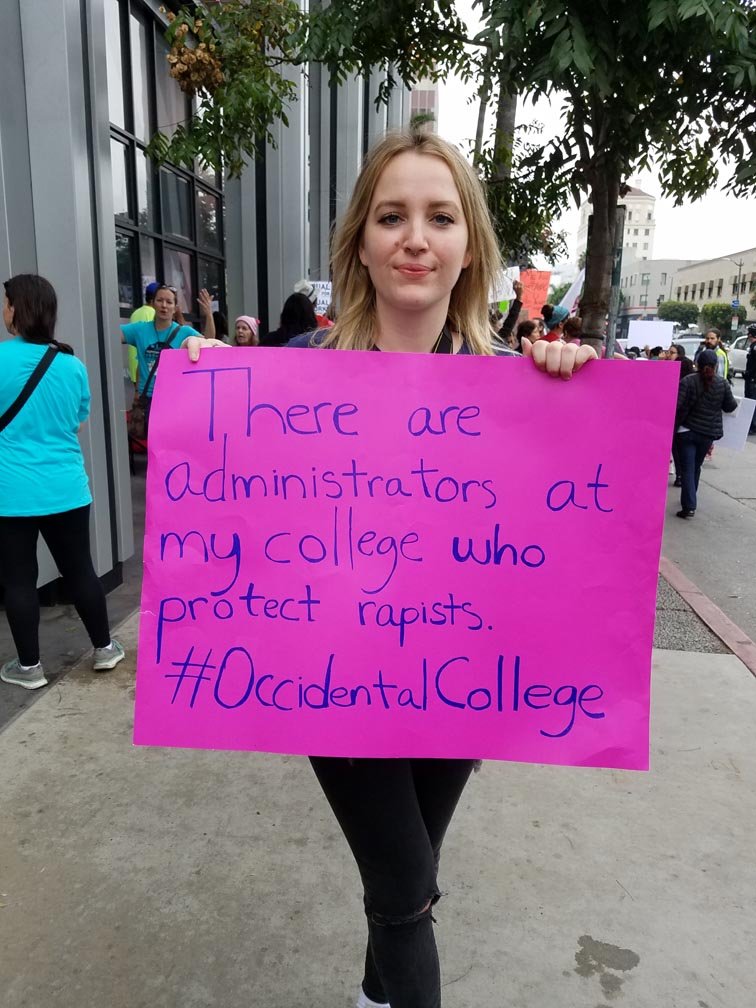
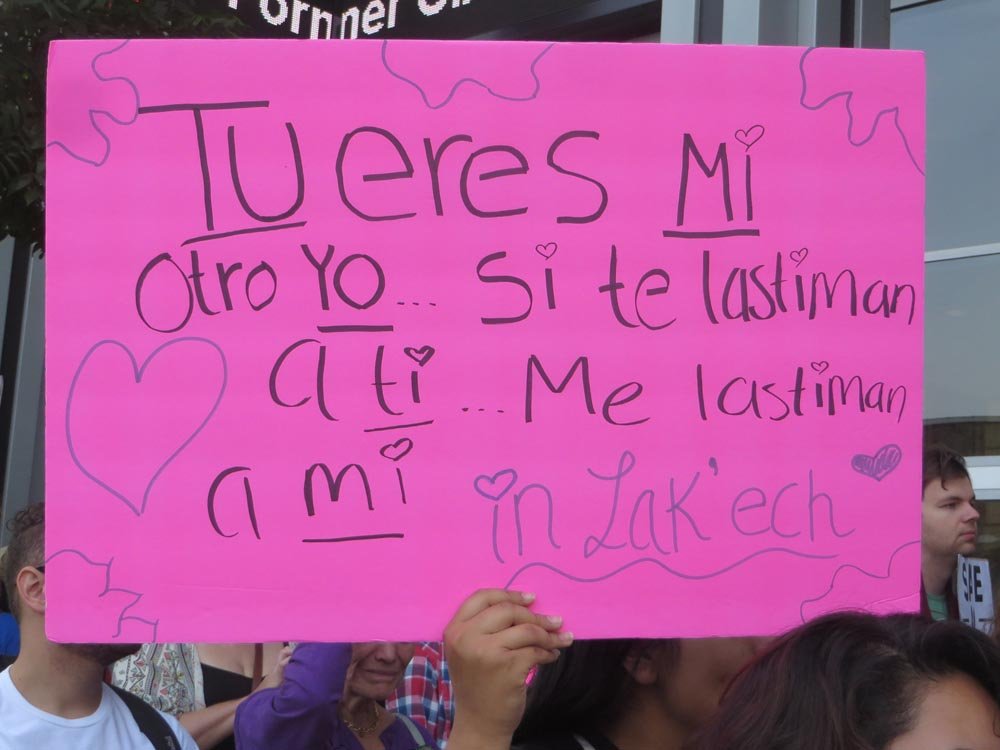
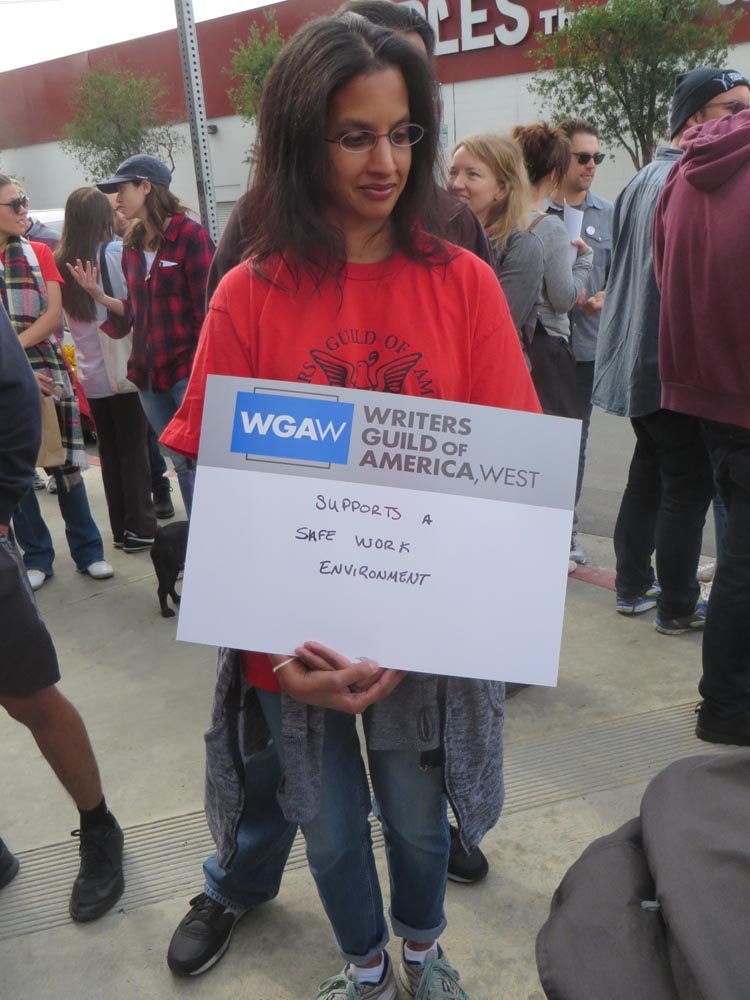
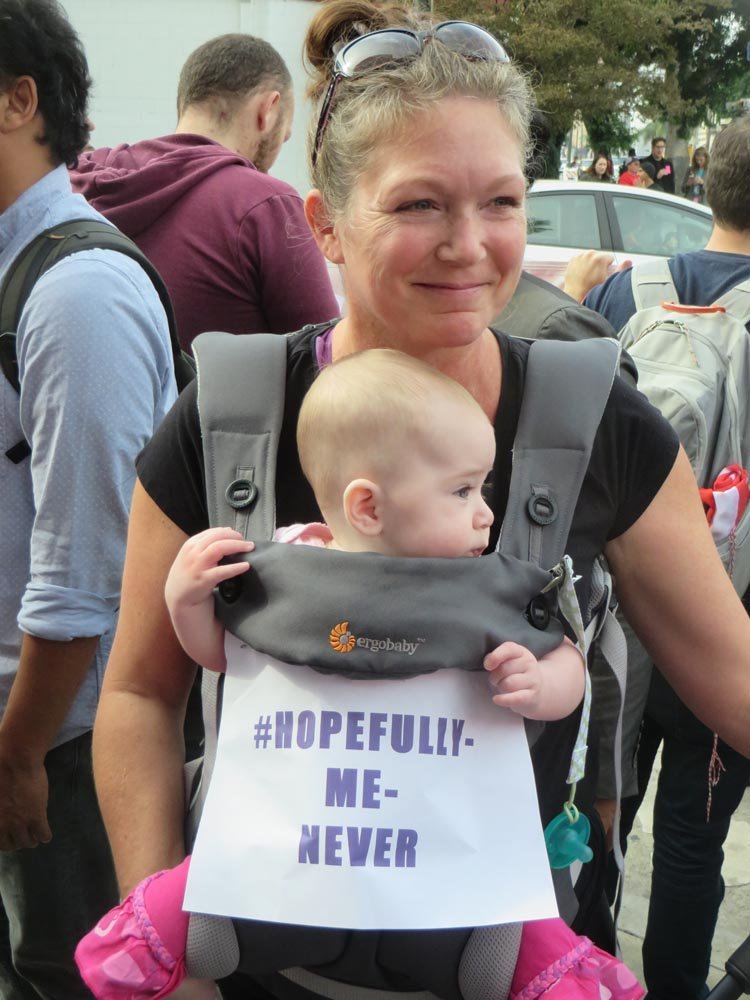
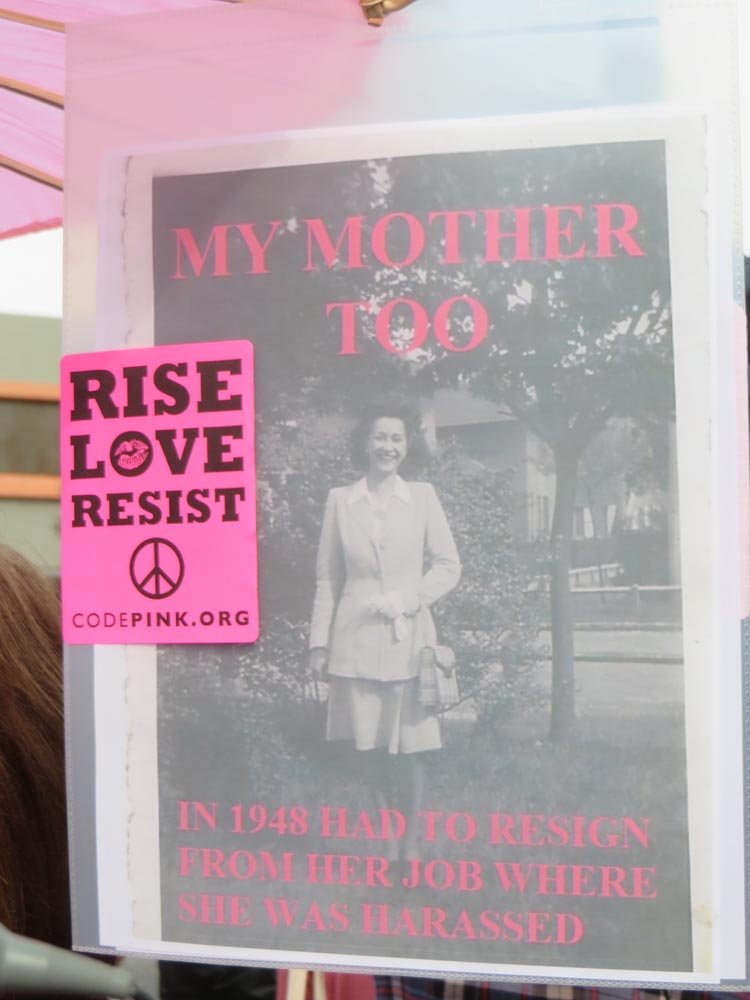
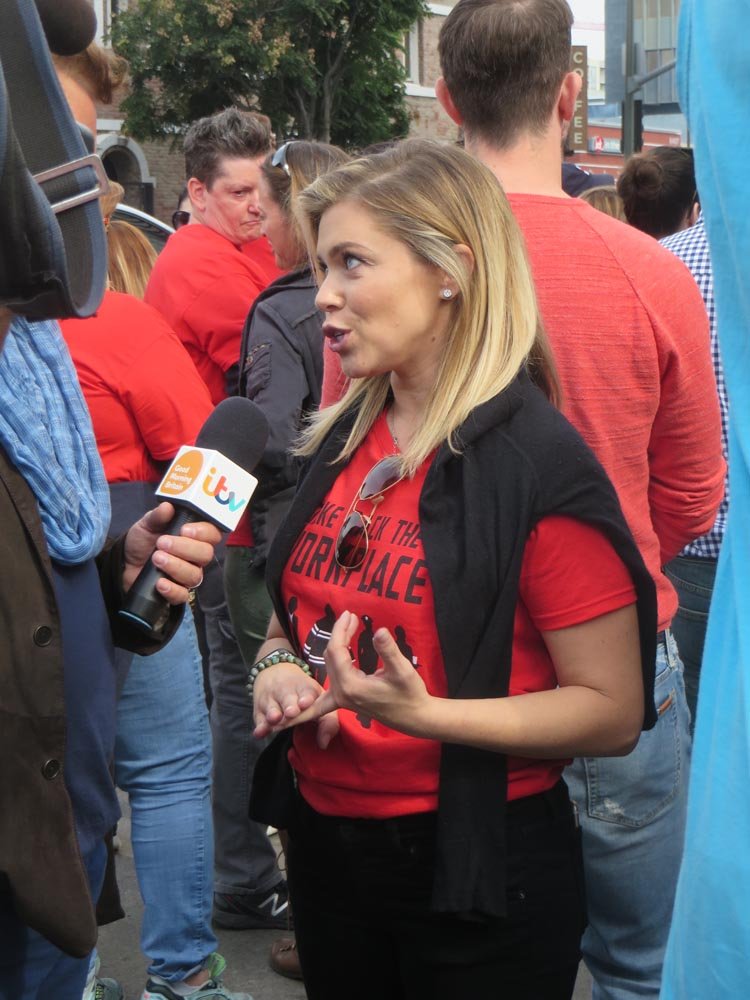
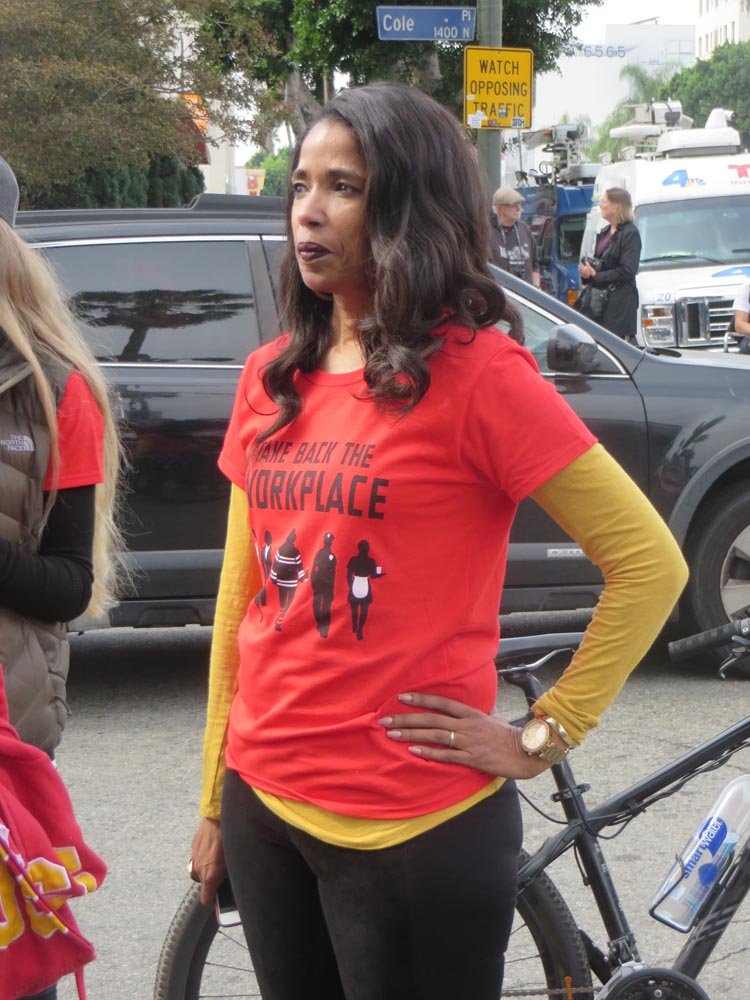
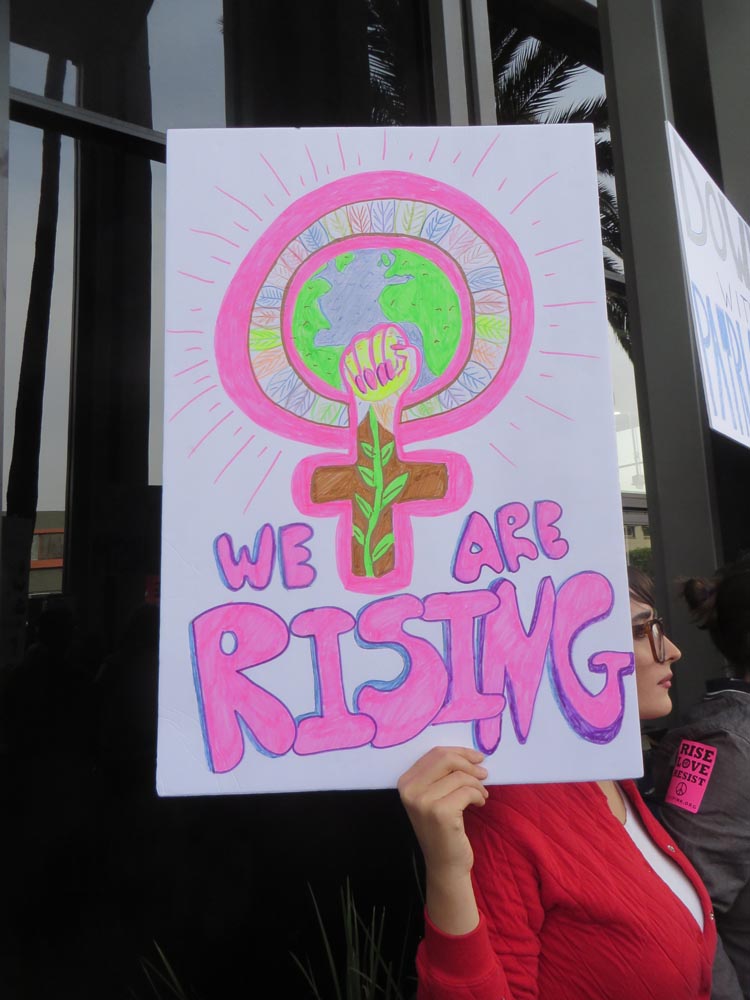
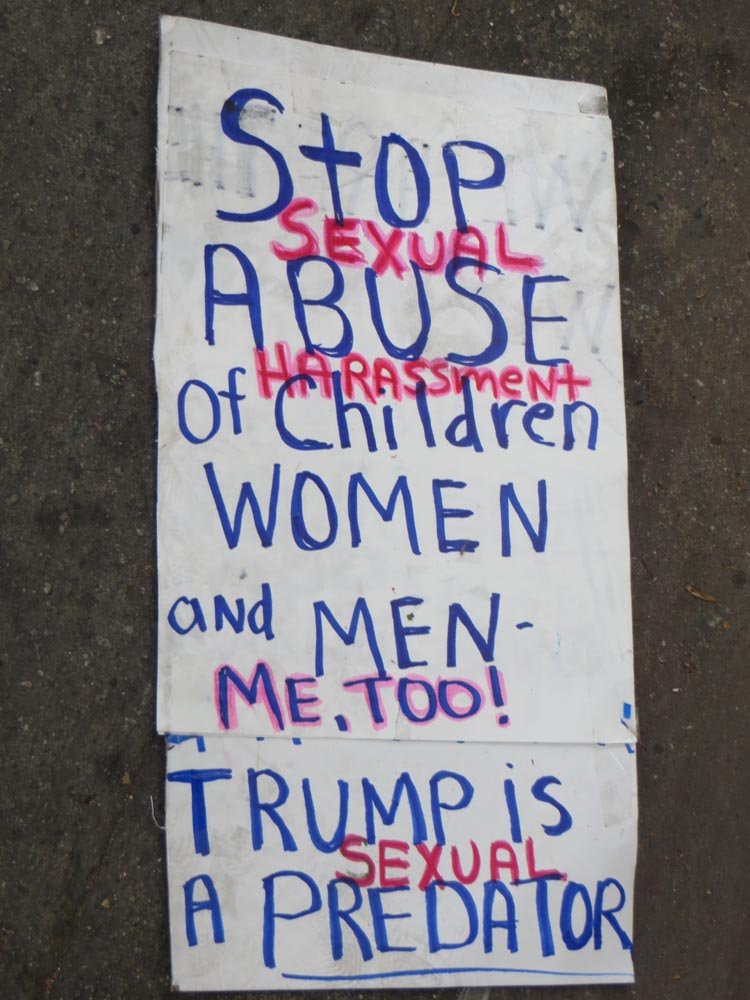
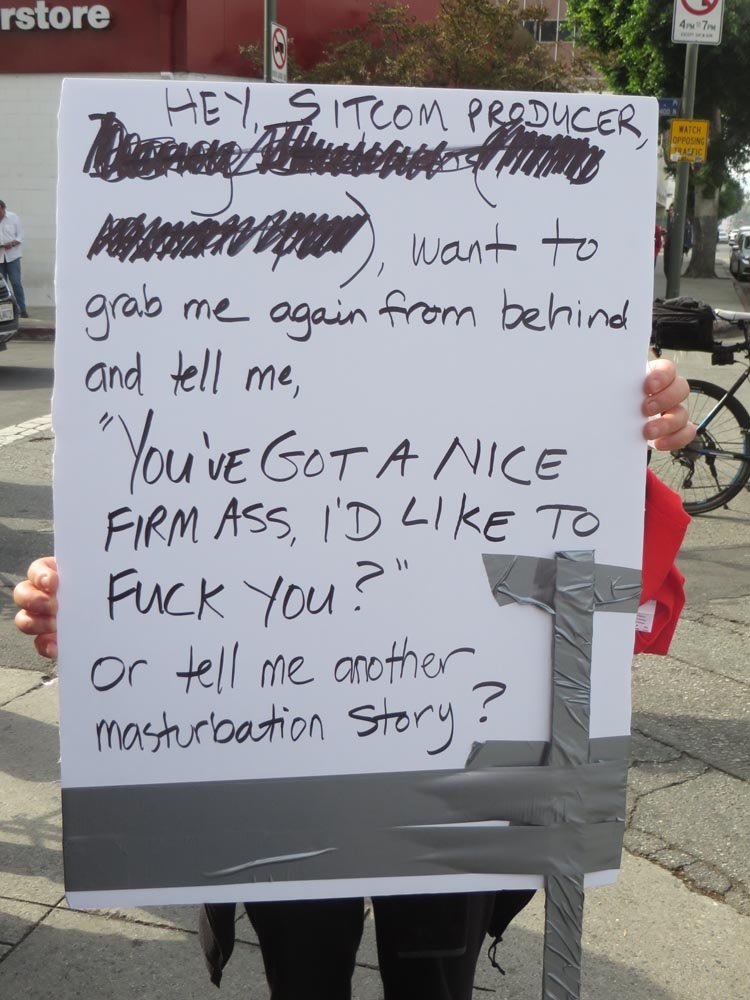
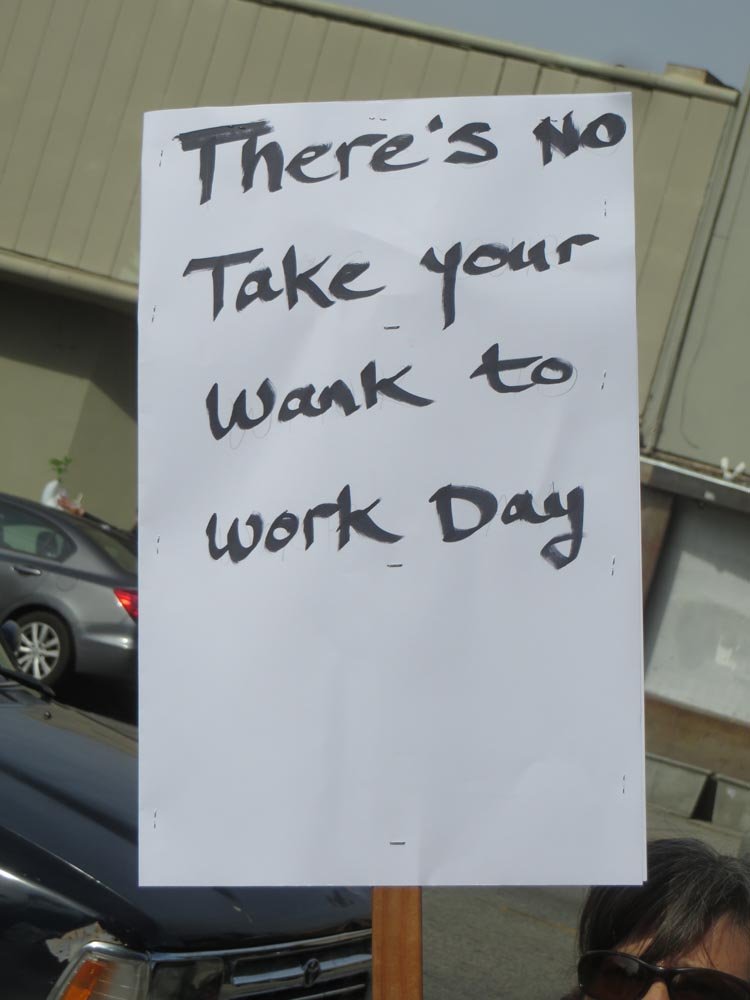
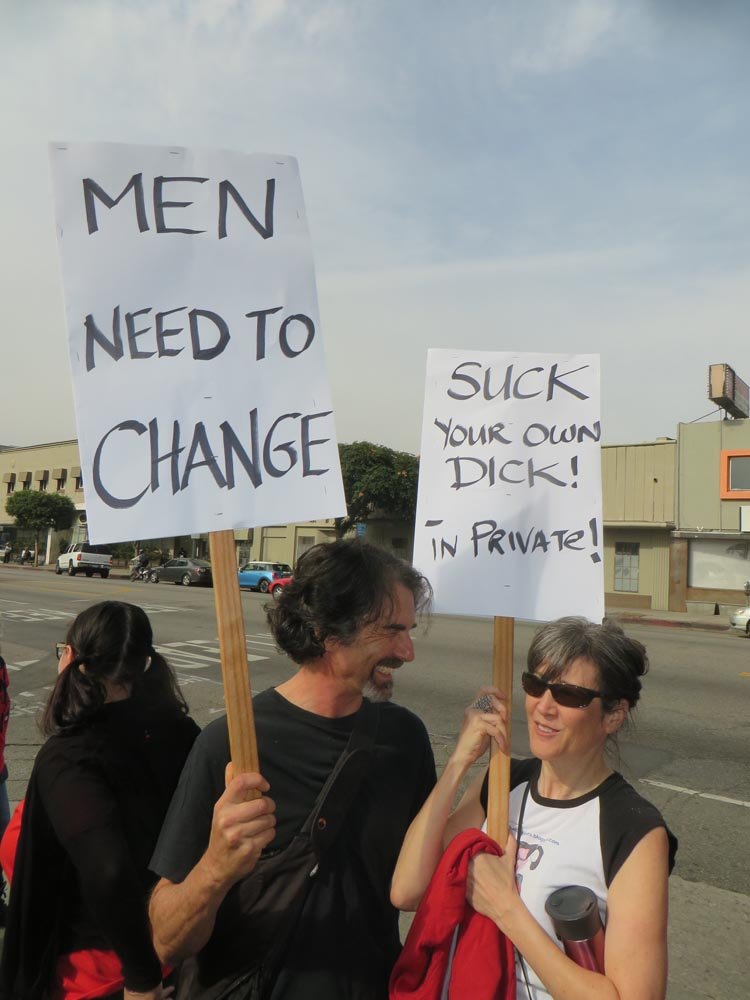
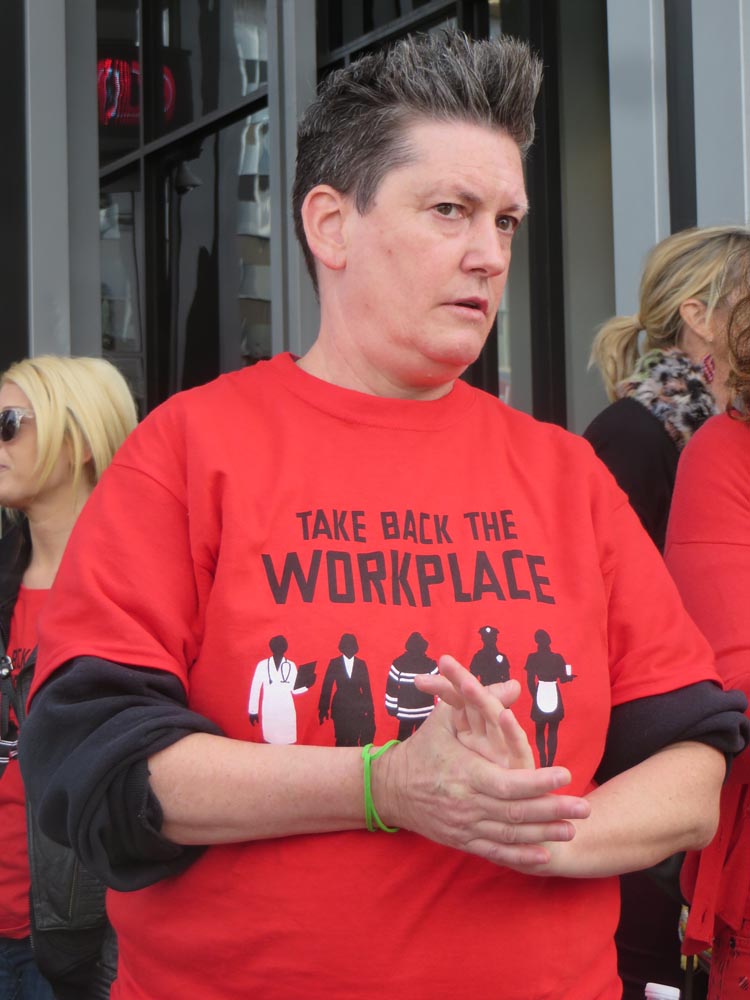
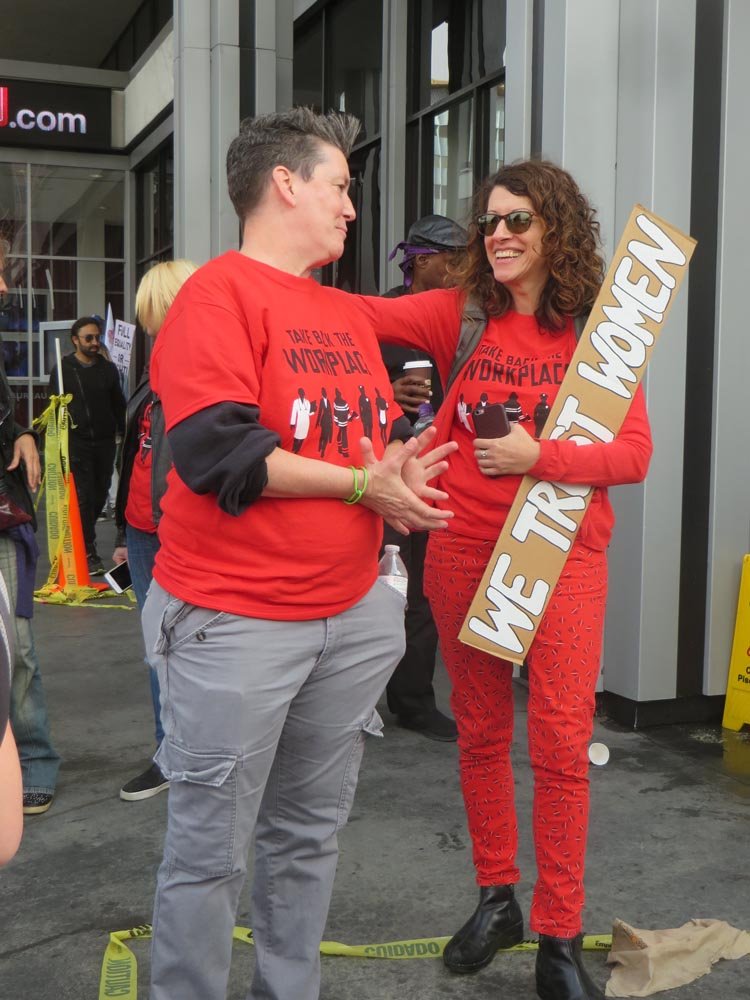
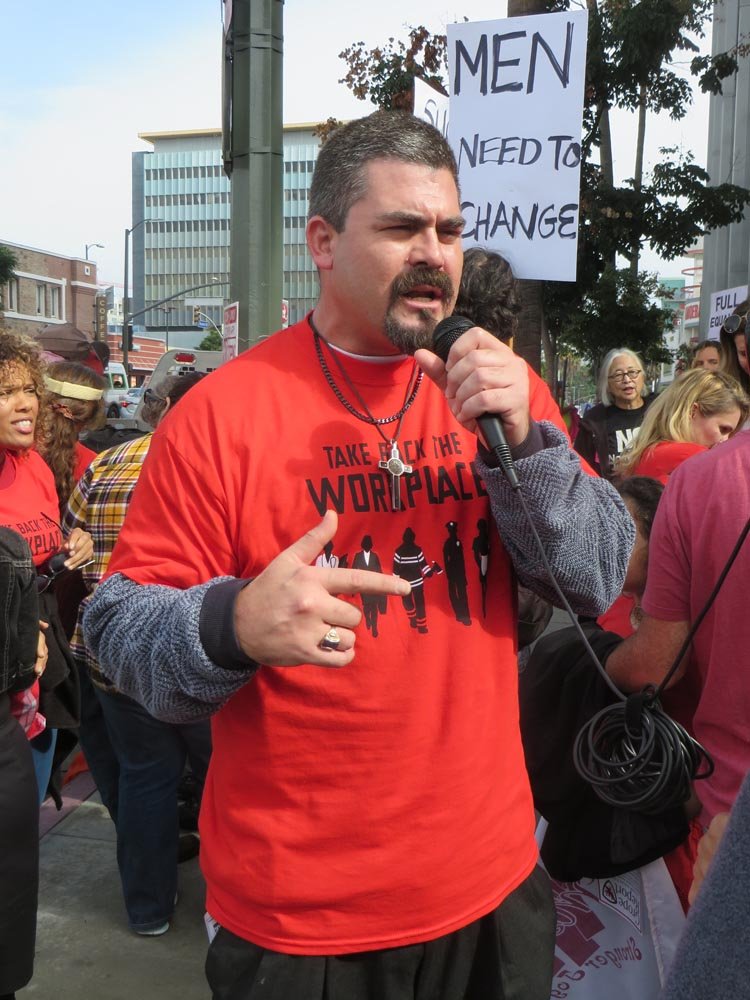
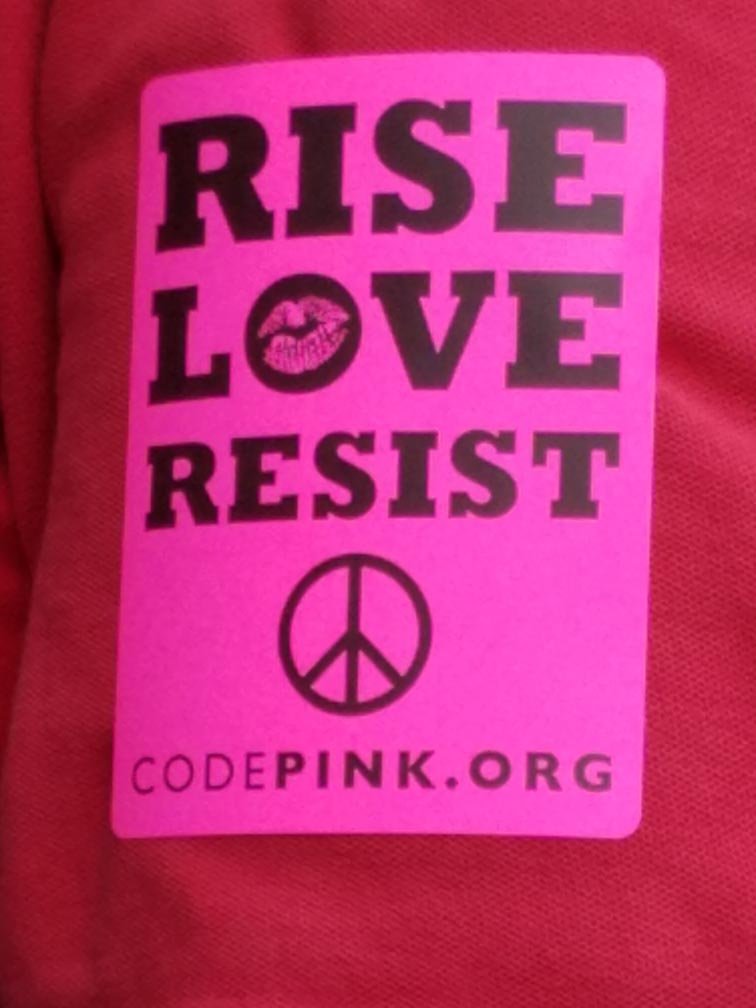
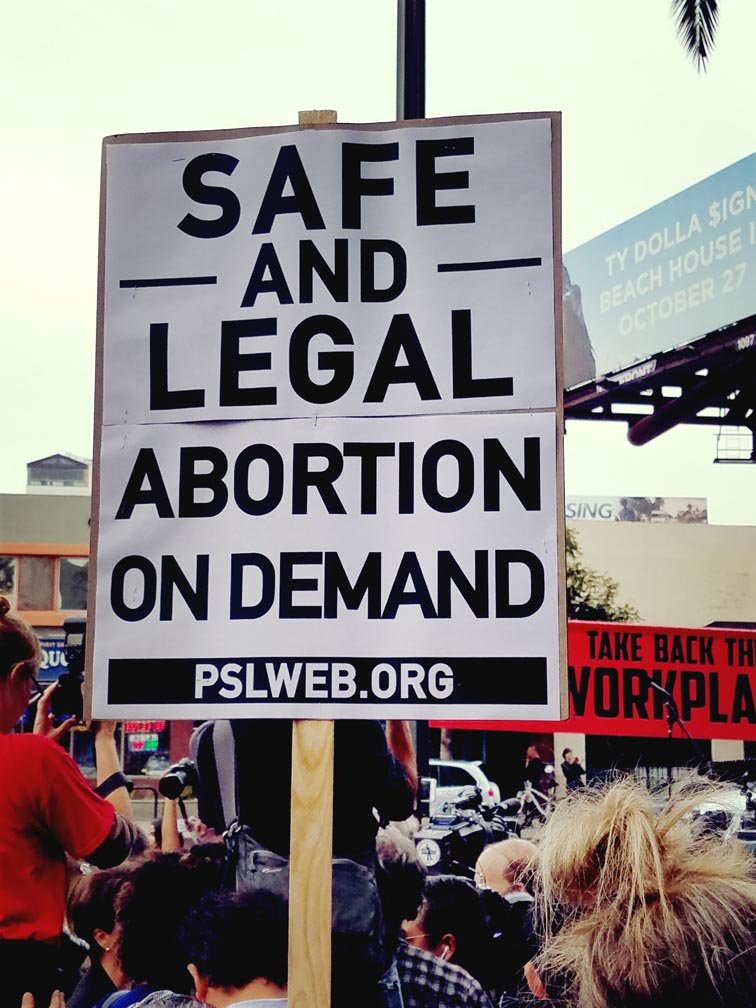
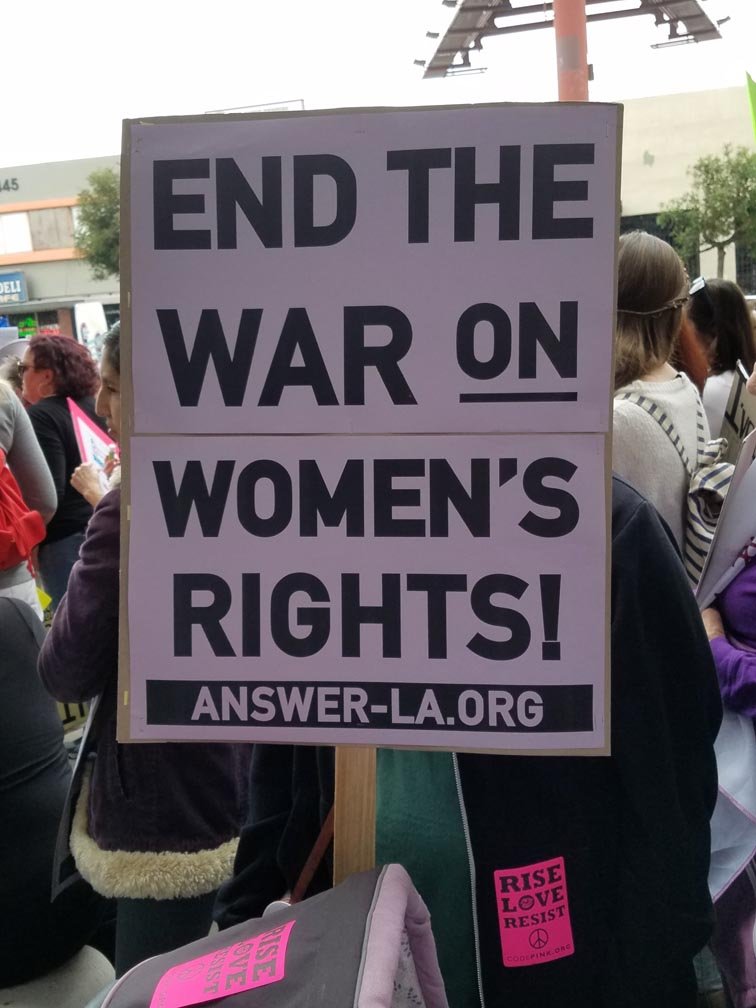
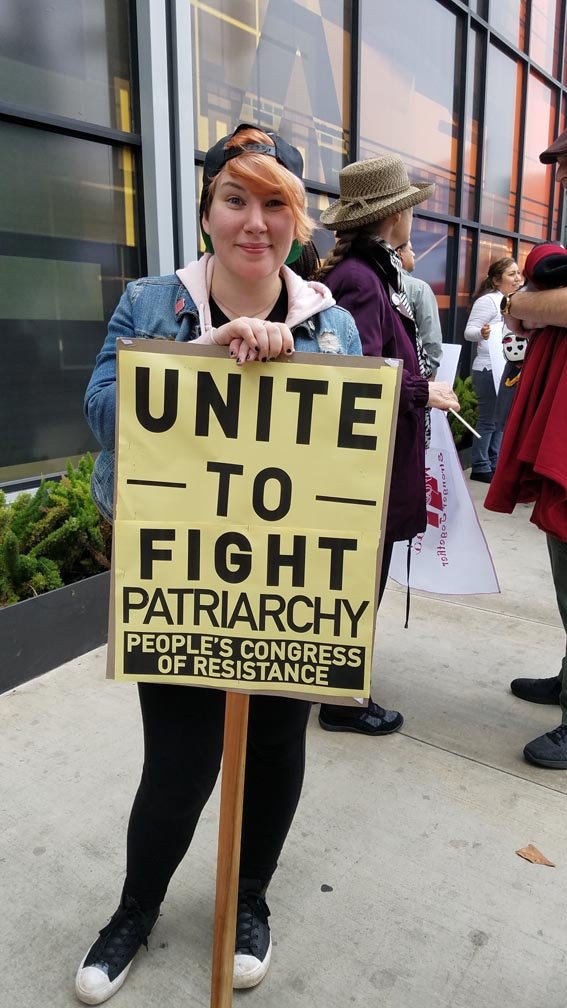
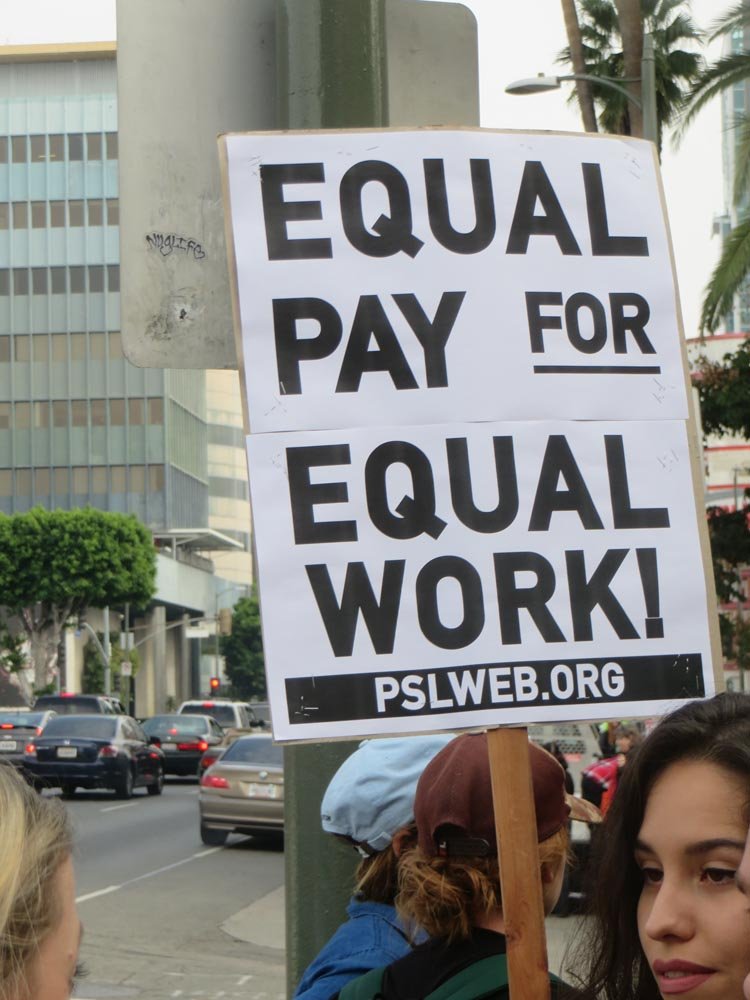
Subscribe to Blog via Email
| M | T | W | T | F | S | S |
|---|---|---|---|---|---|---|
| 1 | 2 | 3 | 4 | 5 | 6 | 7 |
| 8 | 9 | 10 | 11 | 12 | 13 | 14 |
| 15 | 16 | 17 | 18 | 19 | 20 | 21 |
| 22 | 23 | 24 | 25 | 26 | 27 | 28 |
| 29 | 30 | 31 | ||||

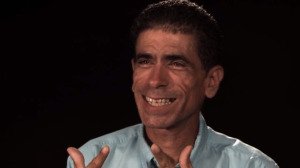
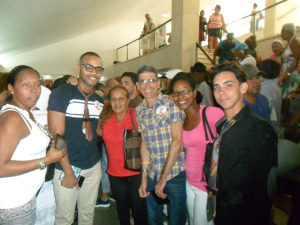

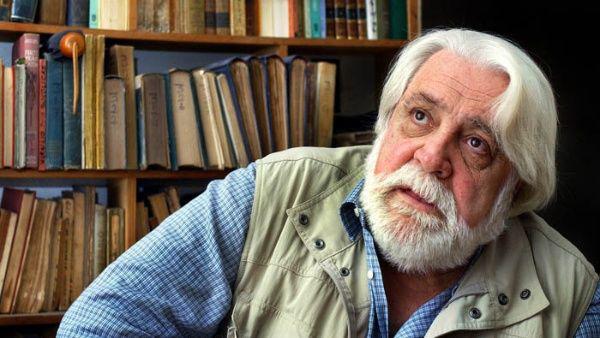
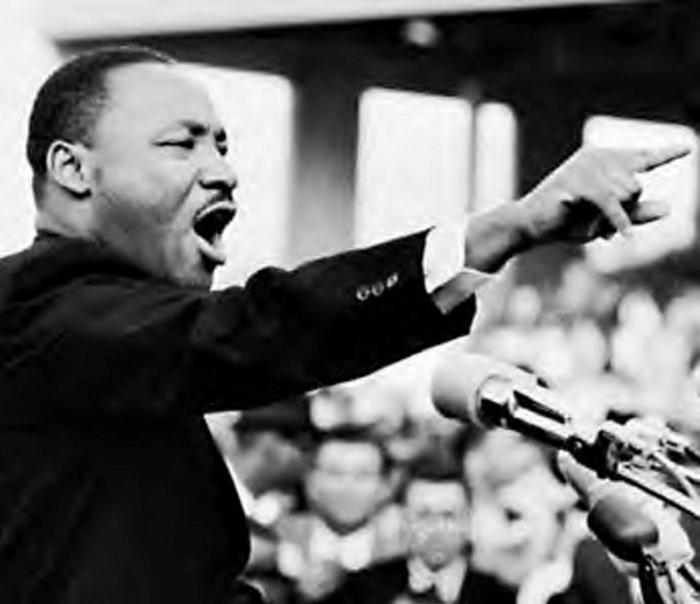


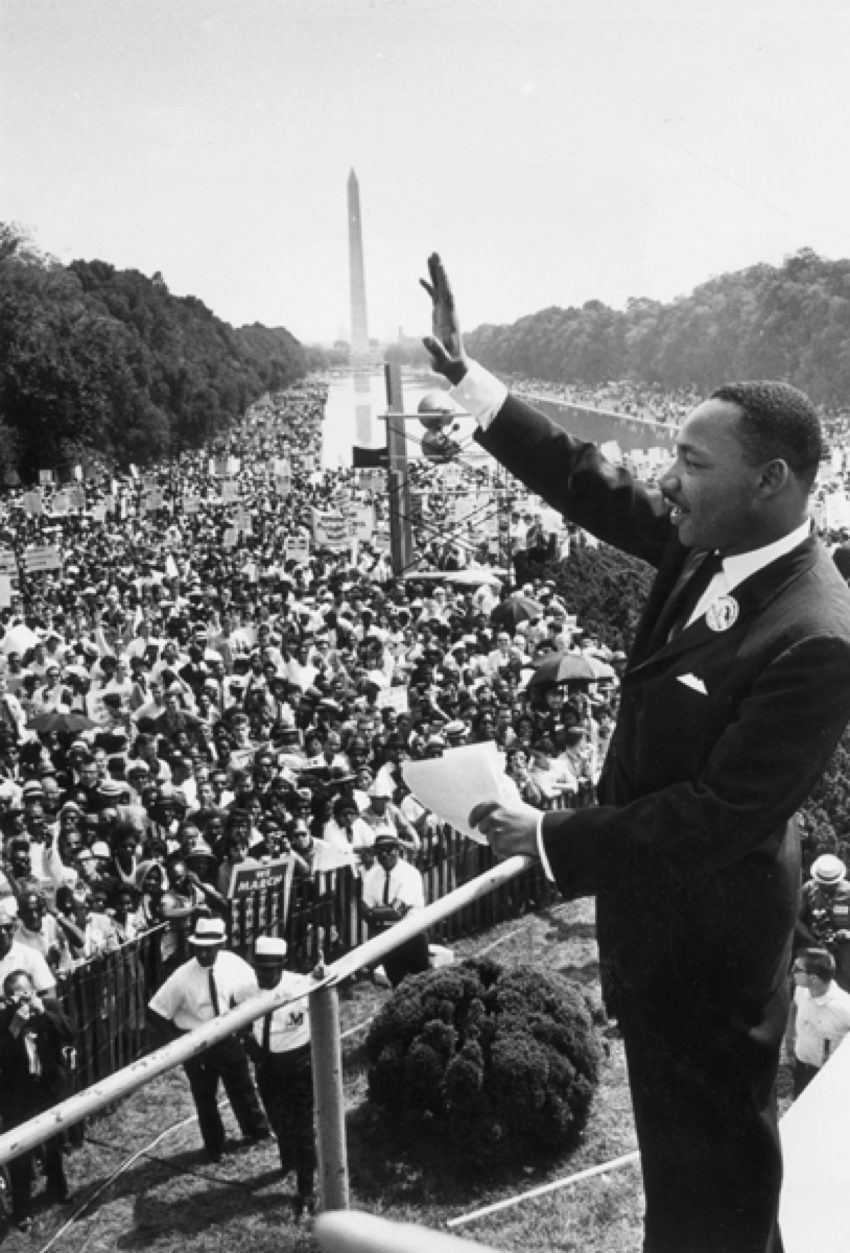
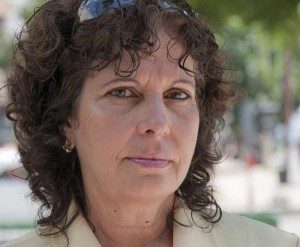
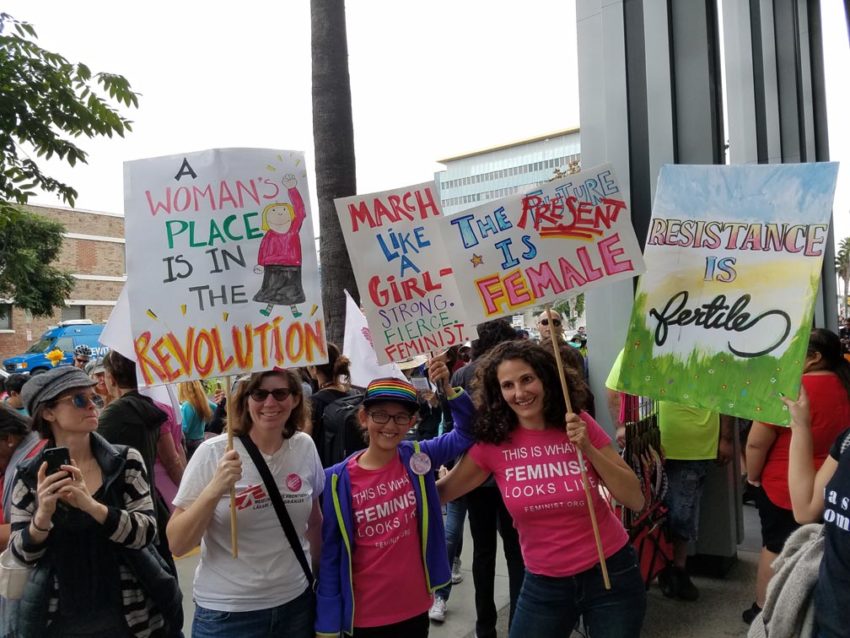
You must be logged in to post a comment.